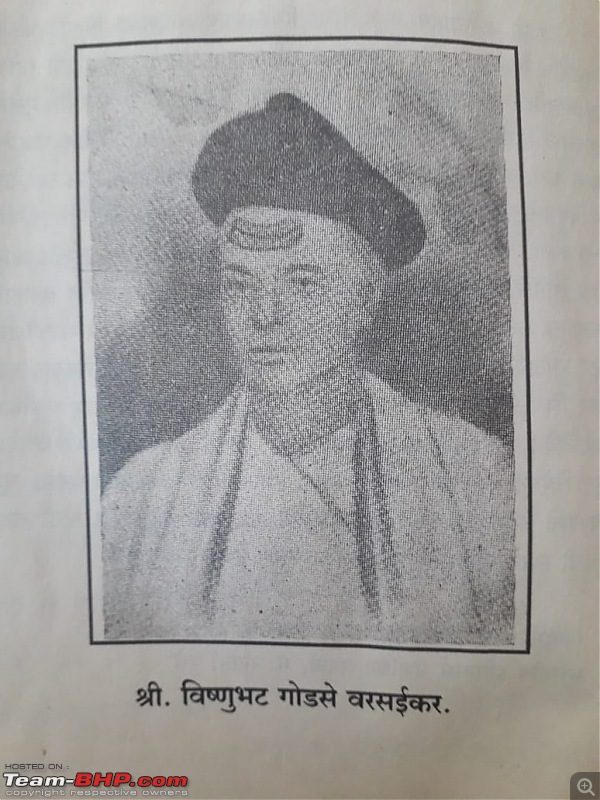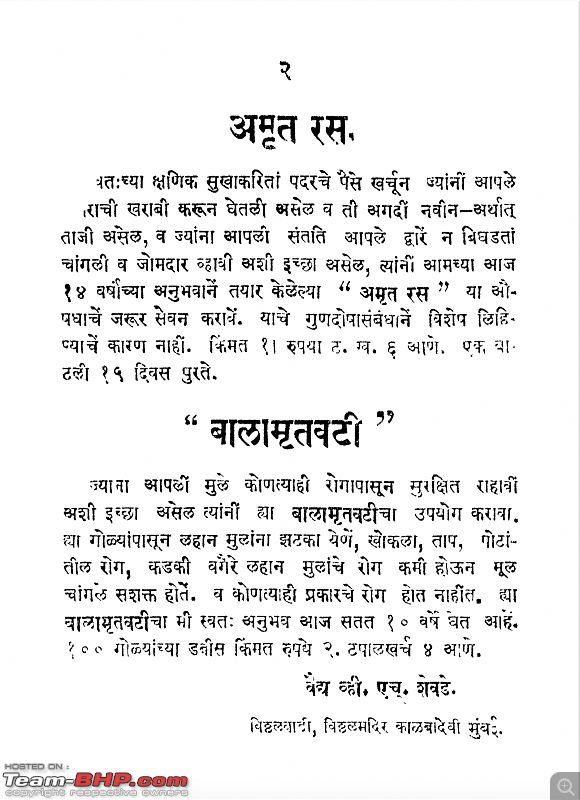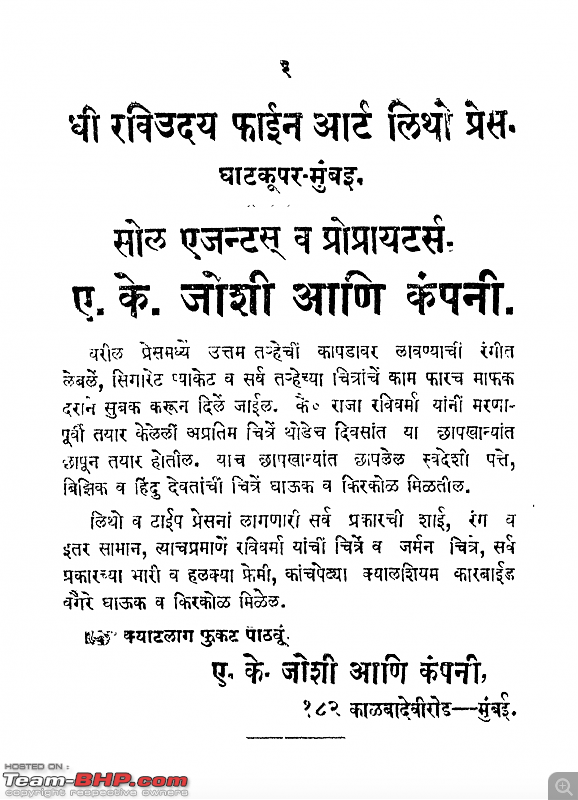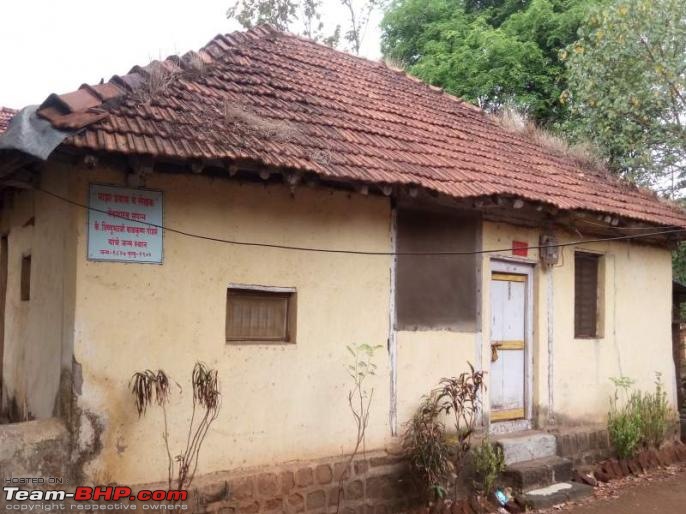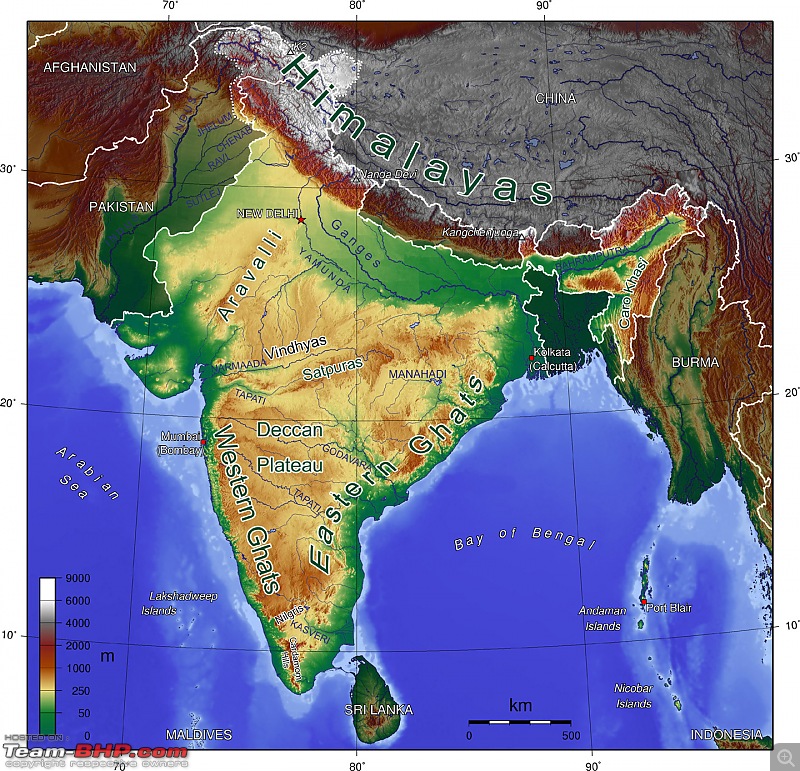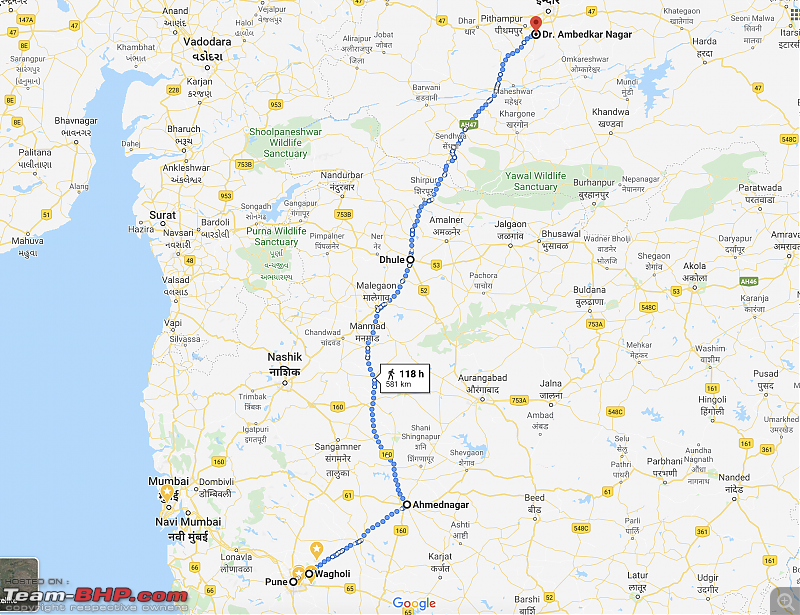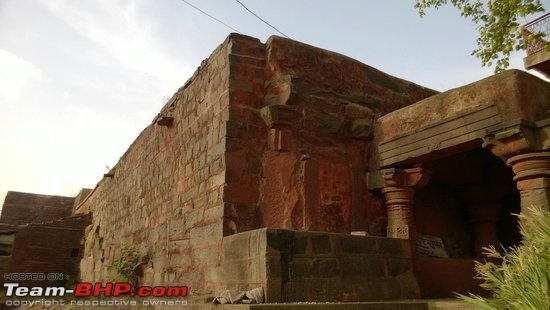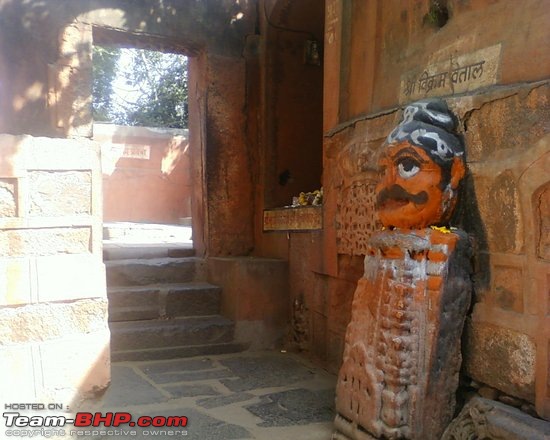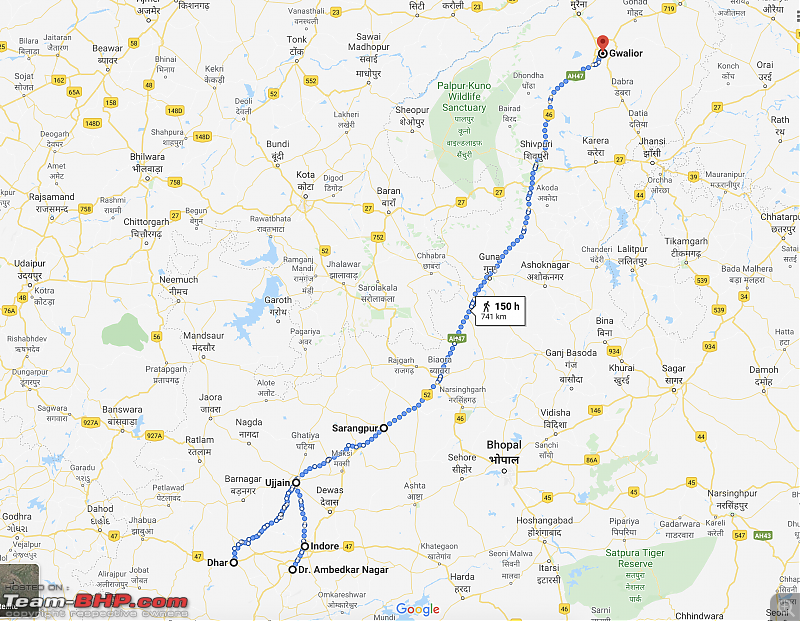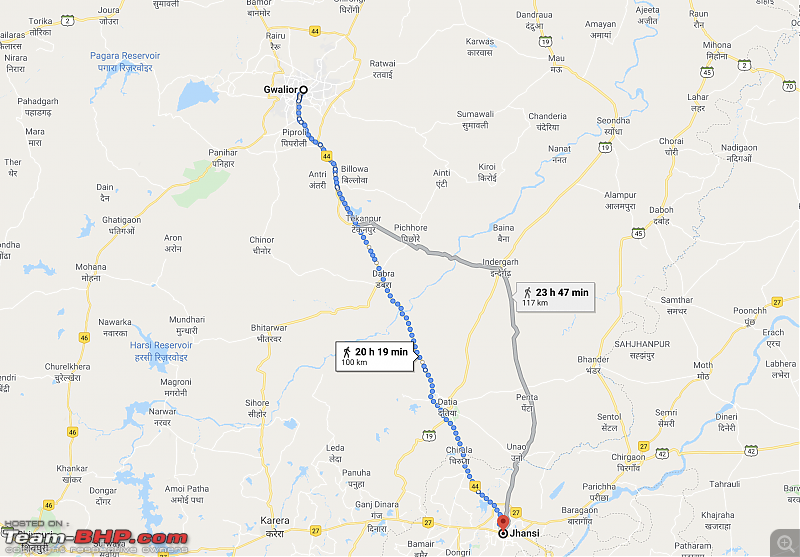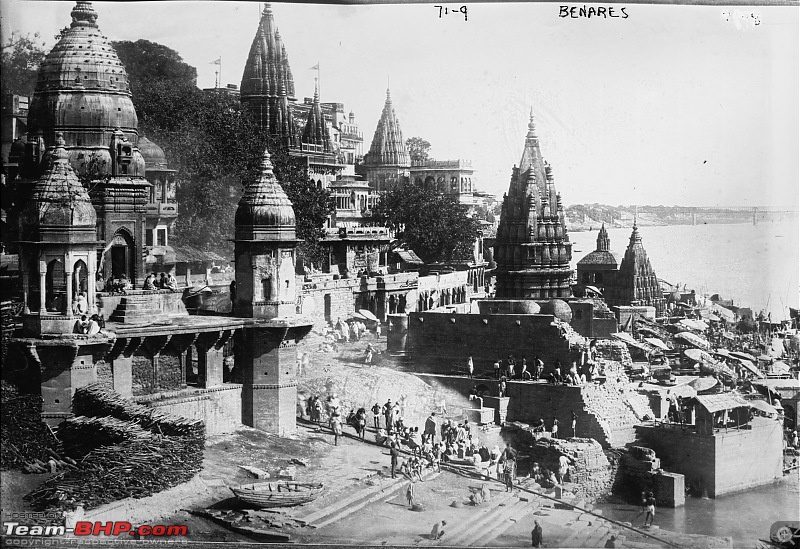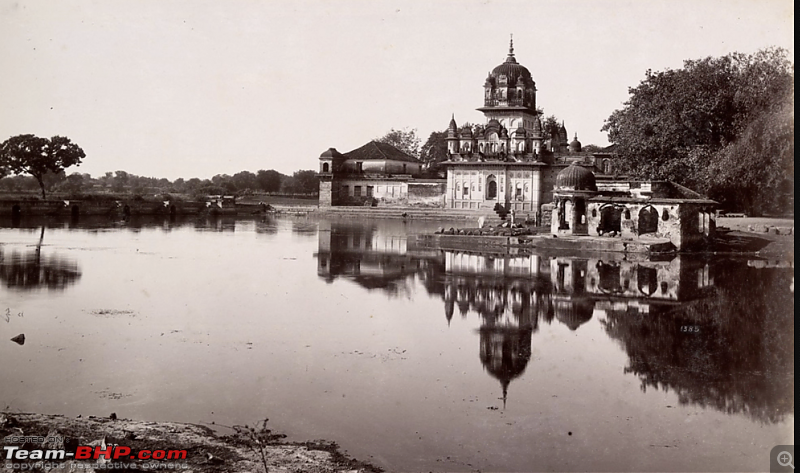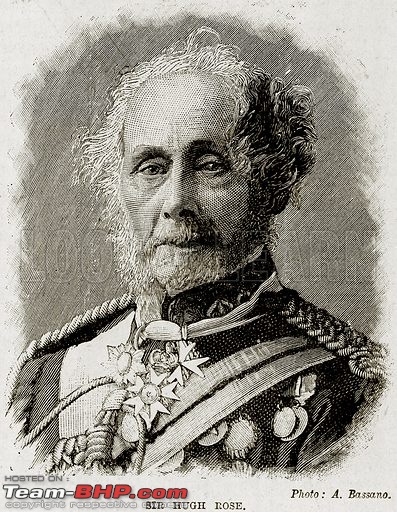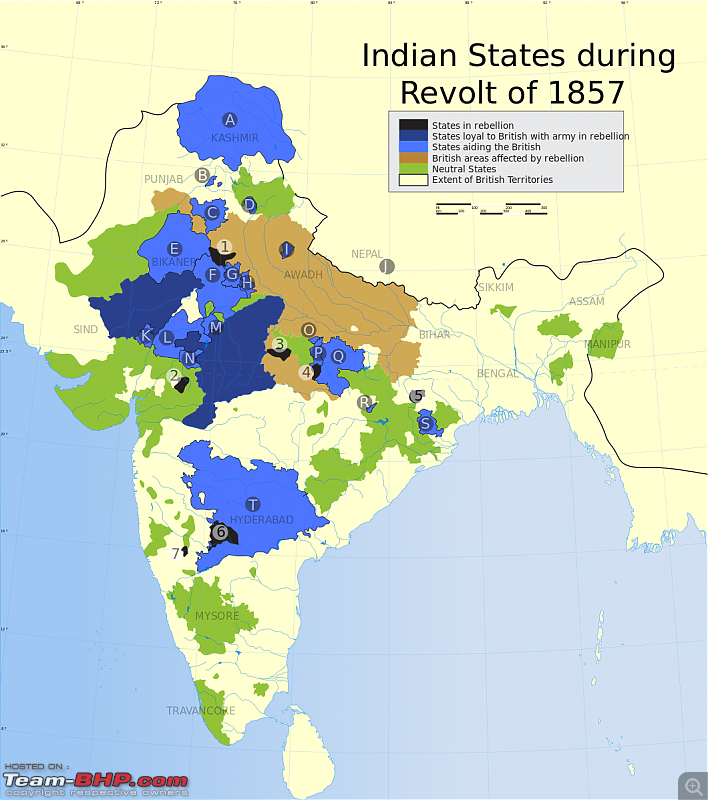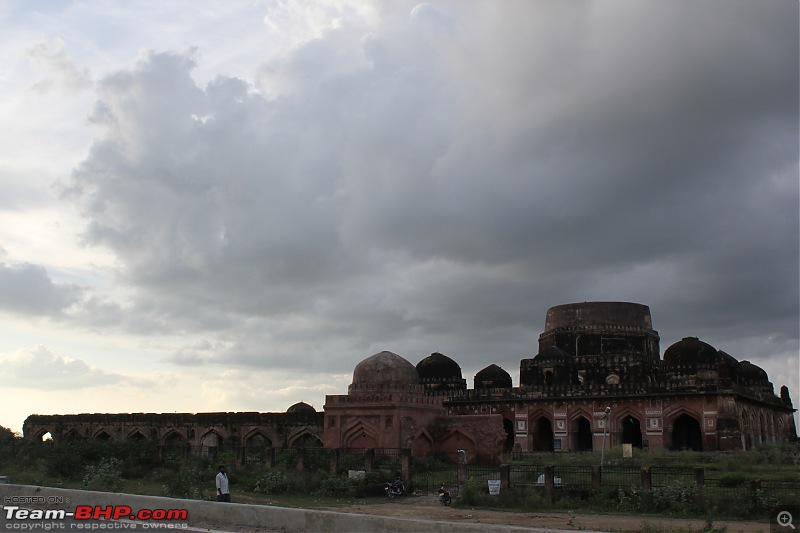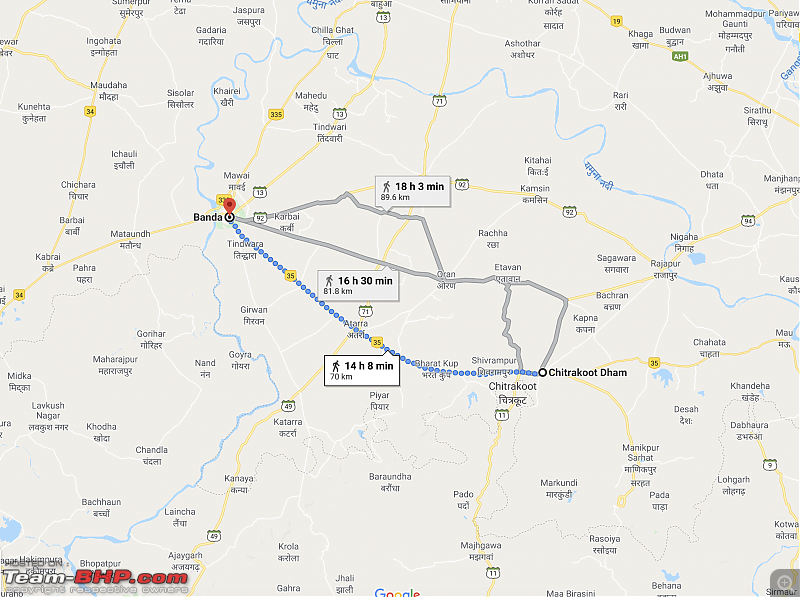| |||||||
| Search Forums |
| Advanced Search |
| Go to Page... |
 |
| Search this Thread |  39,359 views |
| | #1 |
| BHPian Join Date: Jan 2015 Location: Pune
Posts: 973
Thanked: 7,642 Times
| Varsai to Kashi on foot : 1857-59 Prologue History is written by victors. As such future generations get to learn of a one sided past, many a times, a biased one. Such is the power of the written word. Sometimes, while sifting through the words, we come across a few delightful gems which prove, the vanquished too, like the victors, were story tellers. You know how it is on the internet. You start googling for “How many minutes do I need to boil an egg” and you end up reading on "How to construct a nuclear reactor in your garage". During one of my forays on the internet, one thing led to another, and I stumbled across a man, who wanted to tell me his story from over more than 150 years ago. His name was Vishnubhat Balkrishna Godse, a poor Brahmin priest from Varsai village near Pen, Maharashtra. He, along with his uncle, embarked upon a teertha yatra…in 1857. Not only did he manage to survive the First war of Indian Independence, but he also returned home safe and sound, after three years (which was rather fortunate, considering the political upheaval going on around that time.) He had had quite an adventure, and later on, penned it down for his descendants, around 24 years after he returned home. His original manuscript, which ran into 297 pages, made up of "two notebooks and 22 individual pages", was eventually published as a book, few years after his death in 1901. This, is probably the only known instance of a document which talks about 1857, from an Indian perspective. Not only does it give us the vanquished side of the story, but it is also more reliable being a first hand experience, than being just mere hearsay. As such the value of this book, in the annals of history, is priceless. When I first read his book (माझा प्रवास), I couldn't help but think, "What if TBHP had existed in 1901! Wouldn't this make an awesome travelogue?" Sadly it didn't. But fortunately, his adventures have survived. So today, let me tell you his story. Last edited by RedTerrano : 30th April 2020 at 10:19. |
| |  (64)
Thanks (64)
Thanks
 |
| The following 64 BHPians Thank RedTerrano for this useful post: | aah78, Aceman82, akshay81, alphadog, anand.shankar, anandhsub, AVIS, BoneCollector, BopsKA12, C300, Cartik5477, comfortablynumb, dailydriver, Deep Blue, deep_behera, Déesse, dpat17, Dr.AD, dubeneeraj, EVMAN, Fordlover88, GTO, GutsyGibbon, Hariomsingh, hondafanboy, KMT, MandarMax, Miyata, mohansrides, msdivy, neerajdan, nitinkbhaskar, One, paragsachania, PVS, RajeevSharma, rajesh1868, rajvardhanraje, recshenoy, Researcher, roamingrao, Roy.S, rrsteer, saargoga, saisree, saket77, sayakc, sdp1975, shashanka, shipnil, shobhit.shri, spikester, sridhar-v, Sunny_team_bhp, Tgo, turboNath, V.Narayan, vaasu, VaibhaoT, varunswnt, VijayAnand1, Vishal.R, whitewing, zavegur |
| |
| | #2 |
| BHPian Join Date: Jan 2015 Location: Pune
Posts: 973
Thanked: 7,642 Times
| re: Varsai to Kashi on foot : 1857-59 Trivia Scan of the first edition. Note the year of publication. 1907. Also note the price. ₹1.50 !! Before we begin, some advertisements from the same copy, for the discerning reader ! "साबू" here, is not to be confused with "साबुदाणा" used in preparing delicious Khichadi! This "साबू" refers to soap! Note para 2: Mr Wilson of the American Meat Trust swears, as per President Roosevelt's instructions, fat from dead and sickly animals is used to make soap instead of edibles. This is extremely interesting considering
Apparently some things never change
Printer advertising their services. In a book printed by some other printer! Talk about picture in picture! Overall, expected wares on display. Except where it mentions upcoming prints of Raja Ravi Verma (who had passed away, merely one year before this book was published)! Besides this, one more item is very curious. Printing available for cigarette packs! I wonder why would anyone want to print on top of cigarette pack? Did they sell plain packs back then? Curiouser and curiouser !! Unbreakable watches! Guaranteed to work even if dropped from a height! Diamond studded! Oh wait. By diamonds, they mean jewels! Last edited by RedTerrano : 30th April 2020 at 10:26. |
| |  (25)
Thanks (25)
Thanks
 |
| The following 25 BHPians Thank RedTerrano for this useful post: | aah78, akshay81, AVIS, BoneCollector, BopsKA12, Cartik5477, comfortablynumb, dailydriver, Deep Blue, Déesse, Gansan, GTO, mh09ad5578, neerajdan, pramods, PSG, Roy.S, rrsteer, saargoga, saket77, shashanka, Sip, Sunny_team_bhp, V.Narayan, varunswnt |
| | #3 |
| BHPian Join Date: Jan 2015 Location: Pune
Posts: 973
Thanked: 7,642 Times
| re: Varsai to Kashi on foot : 1857-59 Preparation and setting off Varsai has been the ancestral place of the Godses since centuries. Around the mid 19th century, the Godse clan was made up of three brothers. Balkrishna, Keshavbhat and Rambhat. Keshavbhat and Rambhat found employment in the personal household of the Peshwa, Balaji II, whereas Balkrishna served under Sardar Vinchurkar, one of the generals of the Maratha empire. In 1818, the Maratha empire collapsed and the Peshwa was exiled to far away Bithoor. All three brothers decided to accompany their master to the far off land. Keshavbhat and Rambhat made it all the way, but Balkrishna could not proceed beyond the Narmada. Falling severely ill, he eventually managed to return back to Varsai. Years passed. There were new additions to Balkrishna's family now. In 1827, his wife Radhabai, gave birth to a son, whom they named Vishnubhat, eventually followed by Haripant, Dhondbhat and Krushnabai. The Godses had never been rich. But during their employment with the Peshwas they had lived a decent life, with their basic needs met. Life at Varsai was a bit harder. With their traditional vocation of priesthood, supplemented by some rice produce from their family farms, they managed to pull on. Around the time Vishnubhat was 10, his uncle Keshavbhat passed away in Bithoor, and Rambhat returned, married and settled in Varsai. The Godses had always been a joint family, but Rambhat took up residence with his wife and son in a separate house. Inspite of the physically separated households, both patriarchs and their families enjoyed excellent relations with each other. Life quality had gone down a bit, but they managed to pull along in what they had. More years passed. To keep up with the changing times, Vishnubhat's father chose to train him in accounting as well as being a scribe. A local scholar, Vinayakshastri Joshi became his tutor for the shastras, grooming him for the traditional vocation of priesthood. The financial situation had not improved much, but with diligence, frugality and hard work, the Godses managed to eke out a self sufficient, if not comfortable living. Having reached the customary marriageable age of those times, Vishnubhat and his siblings were married. Being on the borderline of poverty, the marriages meant loans, and this caused the first rip in their economic fabric. The brothers discussed this predicament, and possible means to get out of it quite often, but nothing seemed to work out. In 1856, during his visit to Pune, Vishnubhat learnt that Baijabai Shinde, the then Queen of Gwalior kingdom, was planning a Yagna at Mathura. A provision of 7-8 lakh had been budgeted and invitation letters had been dispatched to various renowned religious scholars and priests in Pune, Wai and Nashik. As per the custom, the attendees would of course be honoured with an appropriate Dakshina. This got Vishnubhat thinking. He was of course not a religious scholar, but he was well versed in performing Yagna. So technically he qualified. But, forget being renowned, he was too young yet, to be even known outside his village. And this was strictly, an invitation only event. What to do? Fortunately, after decades of poverty and hardship, fate dealt the Godses a good hand. Balkrishna Vaishampayan, a relative, served in the Queen's court, and he was in charge of the Dakshina. Not only that, despite being far away, he was in regular touch with Vishnubhat's father. A long shot, but it was definitely worth a try. On his return to Varsai, Vishnubhat summoned his younger brother Haripant from Pen. After a lengthy discussion, Vishnubhat finally sent off a letter to Mr Vaishampayan in Gwalior. And they held their collective breath. Eventually the reply arrived, which included the much awaited invitation. So far so good. Next step: get permission for travel from his father. Upon hearing the idea, Balkrishna Godse outright refused. Gwalior was far away. And the roads were bad. And the journey dangerous. And the Godses had almost no relatives staying anywhere along the route in case of emergencies. And men, when far away from home, are easily tempted by bhang and loose women. The answer was a resounding NO! Though Vishnubhat could have sworn a solemn oath to stay far away from vices, he could not argue the factual problems of geography and distance. Also it was sacrilege to go against the father's wishes. His journey had ended even before he started. All he would do that day, was travel back to square one. As the saying goes, bad things come in threes. This might or might not be true. But for Vishnubhat, good things came in threes! It so happened Mr Vaishampayan's daughter, was married to a gentleman named Karve....and the Karves resided in Varsai! Along with Vishnubhat, he had also sent off an invitation to his son in law and daughter, for a visit to Gwalior. And he also instructed to get Vishnubhat along! Mr. Karve visited the Godse household, along with the letter, with the intention of finalising the journey logistics. Balkrishna Godse was unmoved. His answer was still no. He flatly reused to green light the journey. It must have been extremely frustrating times for Vishnubhat (he never mentions this in his book though, we can just imagine) As a dutiful son, it was not his place to question nor argue with his father. He just carried on. Till the time he was served with a final piece of good luck. A few days later, he was running errands at his uncle's place, when his uncle invited him to discuss an important problem. Being a close knit family, his uncle Rambhat was very well aware of the financial situation at the Balkrishna household. Rambhat confessed to his nephew, he too was in a similar boat. His house needed repairs on a priority basis, he was getting old and certain monies were owed to lenders. His only wish was to be debt free before he took his last breath. He had heard of this Yagna being organised in Gwalior. Having served as the Hom-Havan in charge under the Peshwa, he was certainly qualified to attend. But Gwalior was far away. And the roads were bad. And the journey was dangerous. And they had no relatives staying anywhere along the route in case of emergencies. And Haripant was reluctant to make the arduous journey alone. Would Vishnubhat be ready to accompany him? Vishnubhat couldn't believe his ears! He quickly brought his uncle upto date on his efforts and his father's reluctance. Leave it to me. I will talk to your father!, Rambhat assured him. Vishnubhat couldn't have asked for anything more. Haripant was hastily summoned from Pen and that night a family conference ensued. Rambhat, addressing his elder brother, was at his convincing best. Though the households were physically detached, the familial bonds were still extremely strong. Though Vishnubhat was his nephew, he had always treated him like his own son. They would undertake the journey to the far off land together. They would tackle the risks together and split all Dakshina right down the middle. The Karves had already organised a bullock cart for themselves, so the Godses had company. As for the vices, he, Rambhat, would ensure Vishnubhat was always under his watchful gaze. As if on cue, Vishnubhat immediately swore an oath. He would dutifully obey his uncles instructions and wishes, like he would obey his own father. After much deliberation, Balkrishna Godse finally agreed! There were much tears and fears from the mother and wife, but Vishnubhat managed to pacify them both. Since Haripant resided in Pen, he had a talk with his youngest brother Dhondbhat and told him about his duties and responsibilities as the new eldest son of the house. The Karves were contacted. Details like fare, food and accommodations were discussed, fleshed out and finalised. Everything was in place. The yatra could finally commence. And soon enough the day arrived. Vishnubhat was undertaking such a journey to a far off place for the first time in his life. Just like all BHPians on the eve of their travels, he hardly slept that night. Excitement, apprehension, a bit of fear as well as a sense of opportunity to improve the financial situation, all kept him awake. At the crack of dawn, the whole Godse clan was up. He was just about finishing his ablutions, when a messenger came to inform him that the bullock cart was ready and waiting at the village square. Bowing down to the Gods, taking his parents blessings he steeped out. Joined by his uncle, they reached the square. The Karves, their eight year old daughter and a female cook were already there. So were his friends, who, by now had heard of the journey. All were assembled to see them off. A final round of hugs, bowing to the parents, some more tears and the cart set off. So did the whole family. Vishnubhat had to implore them multiple times to turn back. Eventually, they relented. During those days, travel was difficult. More so with a bullock cart. The cart was mainly used for luggage and supplies. Passengers took turns, sitting inside for some time but mostly walking by its side. In this fashion, at the end of the day, they reached Khopoli. They put up for the night in a dharmashala. The next day they climbed the ghat and eventually reached Pune. A halt for a day or two, to recuperate and topping up supplies. The bullock cart was paid for and a new one engaged for the journey till Indore. Tomorrow they would travel beyond Pune. It was all uncharted territory from here on. Vishnubhat would take his first step into the unknown and into history. Last edited by Aditya : 2nd May 2020 at 06:55. Reason: As requested |
| |  (36)
Thanks (36)
Thanks
 |
| The following 36 BHPians Thank RedTerrano for this useful post: | 2himanshu, aah78, agspins, akshay81, anand.shankar, arun_kun, AVIS, BopsKA12, Cartik5477, comfortablynumb, dailydriver, Deep Blue, Déesse, Dr.AD, Fordlover88, Gansan, GTO, Hariomsingh, mh09ad5578, neerajdan, paragsachania, PM - B, pramods, Roy.S, rrsteer, saargoga, saisree, saket77, shashanka, shipnil, shobhit.shri, Slickshift99, Sran, V.Narayan, varunswnt, Vishal.R |
| | #4 |
| BHPian Join Date: Jan 2015 Location: Pune
Posts: 973
Thanked: 7,642 Times
| re: Varsai to Kashi on foot : 1857-59 From the Deccan plains to Central India Nothing expands the mind like travel does. You particularly enjoy it more, if one is young at heart. The road takes you along different regions, scenery, rivers, brooks, mountains, trees, cities, villages and peoples. All this is an enjoyable as well as a learning experience. You travel down the road and at the destination, you find yourself even more mature. It's not easy though. There is a mix of the good with the bad. The body aches, sometimes there is nothing to eat, sometimes not a drop of water available, sometimes you need to spend the night, freezing in some jungle, sometimes you forget to procure something important for the journey, sometimes you are scared of highwaymen and robbers. But all this is part of the adventure. In fact these problems, make the good parts more enjoyable. You have survived, and lived to tell the tale. At the end that's all that matters. By now, the Godse's had settled into a daily routine. Get up at the crack of dawn. Make the most of the cool air and try to cover as much distance as possible. First pit stop around 9-10 AM, around some water source. If it's a river, a refreshing swim and a bath. If not, bathe with a mug from the available puddle of water. A simple meal of rice with some accompaniment prepared by the cook would be ready by then. Resume the journey till the sun peaked directly above the head. Then a break under the cooling shade of some tree. Then the journey resumed till sunset. It was hard and exhausting, but they were making progress. After leaving Pune city, they stopped at Wagholi and eventually reached the outskirts of Nagar. They halted next to a brook. The surrounding jungle was full of red and white flowers. What better place for a Pooja than this? They gathered some flowers, performed a Pooja and thanked the Gods for keeping them safe. Breaking camp the next day, they made it to the city around 10 in the morning. A few days were spent in Nagar, topping up supplies and recuperating. They joined up in a convoy of a few bullock carts, made up of Brahmins going for the Yagna. Eventually all of them arrived at Malegaon. Camped at the dharmashala by the river, they noticed the 5-6 bullock carts in the "parking lot". Further enquiries revealed this was the convoy of Bapusaheb Sangamnerkar. Bapusaheb was a renowned pious personality, well versed in the Vedas. The Godses and their fellow Brahmins went over to seek his blessings. Bapusaheb was pleased once he came to know of their destination and he organised a Jagran (night spent singing bhajans) at the residence of the Rajebahadur Malegaonkar (descendant of Naro Shankar, one of the generals of the Peshwa. The venue was probably the Malegaon fort.). A few local Brahmins, Bapusaheb, the Godses and their companions. Rajebahadur and his family in attendance. The Jagran went on till 2 AM. Vishnubhat even notes the menu. Condensed milk! And in the end, One rupee as Dakshina! This was the first money, he had earned on his journey. He was winning the fight against poverty! With God' grace, he would eventually be debt free !! After the Jagran everyone returned to the dharmashala. Unfortunately, one of Bapusaheb's companion, a Yajurvedi Brahmin, was bitten by a snake in the darkness. Local medicines were administered. A messenger was dispatched to convey the news to Rajebahadur, who personally arrived along with his vaidya (physician). Sadly it was too late for the poor fellow. Seeing impending death, he was all tears, lamenting about his family. His sobs of despair continued through the night, and he eventually breathed his last around dawn. This incident shook Vishnubhat a lot. To die in some dharmashala far away from your family and loved ones! Such was the frailty of unpredictable life. Each and everyone of those present had moist eyes, probably thinking the same thing. But life moves on. Bapusaheb did the last rites and the Godse convoy also moved on. Travelling via Dhule, they reached a place called Karvand Bari, at the base of the Satpuda mountain range. The Satpuda range acts as a natural barrier between the Deccan plateau and Central India. (Think Jon Snow and the Wall in the north) Even today, this region is lush with vegetation and forests. Imagine how it might have been in 1857 ! The name Satpuda, derives from it's original, Shatpura, i.e. a hundred mountains. From the name, one can get a fair idea of the terrain. Now imagine traversing hundred mountains...in a bullock cart! Vishnubhat Godse did exactly that! He notes: We set off, a few hours before dawn. The night was star lit and there was a mild refreshing breeze. The mountains are tall and numerous, but not that strenuous, their incline being gradual and manageable. It takes 7 days to cross the range. The forests offer a nice shade and the landscape is full of pretty flowers. Numerous Govt built dharmashalas are situated along the route, to aid the traveller. Once we stayed at one, built specifically for merchants engaged in the Opium(emphasis mine) trade. Familiar trees are interspaced with lot of villages belonging to the Bhils. The village houses are typically constructed with mud and bamboo. But at random intervals, stone built Bhil forts were visible. Overall we did not find the journey that exerting. Note: Govt here is the East India Company. Check out the wiki entry on Opium Wars to find out why they would encourage Opium trade. Eventually Vishnubhat and his companions managed to cross over. By evening, they halted for the night at a dharmashala. Mahu cantonment lay a few days away. Dinner finished, the travellers were just about preparing to settle for the night, when suddenly there was some commotion outside. Two platoons of Indian soldiers had pulled over at the dharmashala. One side effect of travelling far away from home, is that you make friends quickly. The soldiers were originally from Goa side, so language was not a problem. Acquaintances made, all travellers settled comfortably, chatting each other over paan supari. When the soldiers learnt the reason for these Brahmins' journey, they dropped a bombshell. You should go back. You are civilians. Plus you have two ladies and a child with you. But why? Three days from now, a civil war will break out. There will be much fighting and bloodshed. You don't want to get caught up in this turmoil, so far away from home. And just like that Vishnubhat's blood turned to ice. The paan supari seemed to choke him. Finally he managed to ask But who is going to fight whom? And why? What does this even mean? And the soldiers explained. The British were ruling sensibly. Till now. Recently they imported the latest carbines (Vishnubhat calls it kadamini guns!). These require special kind of cartridges. We came to know from an authentic source that these cartridges are greased with cow and pig tallow, which needs to be chewed down before usage. This is against the religion of both Hindus and Muslims. We informed the white officers accordingly, but they are unwavering in their decision. Letters were sent to the Governor in Kolkatta, but to no avail. They have decided that all Indian soldiers will be assembled unarmed on the 10th of June. Those who refuse to accept the cartridges, will be arrested. So it was decided to strike first. Three days from now, we will tell the British, for the last time, not to force the cartridges on us. If they refuse, we will kill all the British officers, and take over all arms, ammunition and treasury. All cantonments will then be burnt to the ground. Thats why we are headed home to visit our family and loved ones. You too should head back. When a professionally trained soldier tells you, not to proceed, for on that path lay danger, only a simpleton or a fool would ignore the advise. Vishnubhat was neither. But he was caught between a rock and a hard place. Ahead lay danger. But behind lay a mountain of debt. What to do? Should they gamble and risk their very lives? After a prolonged discussion amongst themselves, they decided to press on. The Indians were fighting to uphold their religion. They were poor Brahmin civilians. Who and why would anyone want to harm them? Convinced of their logic, and frankly speaking not having much of a choice, they went to sleep and resumed their journey onward the next day. There was a slightly discernible change now. Usually they encountered only locals or fellow travellers on the roads. Now there were noticeably more soldiers en route. Almost all of them warned them to turn back. A few soldiers, upon hearing their decision to press forward, advised them to try and reach Indore by the tenth of the month. One morning, as they commenced their journey, they realised they would enter Mahu today. And Mahu was a cantonment. Cantonment meant nothing but trouble. Reasoning, the faster they crossed Mahu, the safer would they be, they picked up their pace. The time was now around 10 in the morning. Mahu was hardly 15 minutes away. The usual chatter had died down. Everyone was walking along in silence, eyes and ears peeled. Only the bullock cart bells punctured the silence. Besides their group, not a soul was visible on the road. Suddenly the sound of guns and cannons pierced their ears. Thick black smoke could be seen billowing up into the air, at some short distance. Everyone went numb with shock. Terrified, they pressed on. The Mahu cantonment was visible now. Being a check post between north and south India, it was built on a humongous scale. Vishnubhat estimates it to be around 3 kos (~9 KM) wide. It lay massive and wide, blocking their way. And all of it was on fire! It was high noon. The sun was overhead. A strong breeze was blowing, spreading the all consuming flames even more. The air was full of dust and acrid burnt smell. Soot particles could be seen floating around in the air. Indian soldiers could be seen, all over the place, weapons in their hands, hollering instructions to each other. It was pandemonium. Unsurprisingly, they were spotted. Almost immediately around 200 soldiers ran over to them, weapons drawn and swiftly surrounded them. The bullock cart was drawn to a halt. The fear was very very real. Vishnubhat could hear his heart was pounding in his ears. His mouth had run dry. But fortunately, he still had his wits about him. Eventually he managed to speak. Soldier sirs, we are poor Brahmins from Pune. On the invitation of H.H. Baijabai Shinde, we are en route to Mathura, to attend a Yagna organised by her. The only valuables we are carrying are the religious granths and pothis. You are soldiers fighting to uphold the religion. We are poor Brahmins, engaged in the service of the same religion. We are on the same side. Robbing or harming us will not help you or your goals you in any way. Instead, why don't you escort us to some safe place under protective escort? This will surely earn you punya. We knew the war would break a few days back itself. But we still pressed on, confident that good soldiers like you, fighting to uphold the religion, would not harm poor Brahmins like us. The plea was heard and considered. The baggage train was inspected and the existence of religious books was confirmed. Finally the soldiers made up their mind. They could offer no assistance as far as the yagna was concerned. But the travellers were now under the protection of the posse. They need not worry about expenses. Or their life. All this time, the soldiers were engage in a civil and courteous discourse with the passengers. Their weapons were sheathed, the guns lowered. Suddenly they spotted a mail carriage. In a moment blades glistened in the overhead sun. The carriage was swiftly intercepted. The driver cut down. All mail, paper, and documents inside the carriage was swiftly dispersed over the open land. The carriage and horses appropriated, the soldiers commenced to uproot all telegraph poles in the vicinity, some even fashioning whips from the pieces of telegraph wire. From civil to violent in a moment. Like a switch was thrown. The passengers were shocked! Fortunately, the soldiers, continuing their civil behaviour, invited the travellers to put up camp, under the shade of a nearby tree. They complied. The bullock carts were parked as instructed. The cook rustled up a meal which was eaten in silence. And they day dragged on. Last edited by RedTerrano : 30th April 2020 at 16:07. |
| |  (30)
Thanks (30)
Thanks
 |
| The following 30 BHPians Thank RedTerrano for this useful post: | aah78, akshay81, BopsKA12, Cartik5477, comfortablynumb, dailydriver, Deep Blue, Déesse, Fordlover88, Gansan, GTO, Hariomsingh, MandarMax, mh09ad5578, Miyata, neerajdan, paragsachania, PM - B, pramods, Roy.S, rrsteer, saisree, saket77, shipnil, shobhit.shri, tp_dominator, V.Narayan, varunswnt, Vasuki, YashD |
| | #5 |
| BHPian Join Date: Jan 2015 Location: Pune
Posts: 973
Thanked: 7,642 Times
| re: Varsai to Kashi on foot : 1857-59 Mission accomplished? Next day, the sun rose, and yesterday seemed like a dream. Morning ablutions finished, and the soldiers gave orders to break camp. By now even the local civilian population had joined up, and everyone started off towards Indore. Bypassing Indore, they carried on. Toiling under the hot sun, always on the lookout for possible violence, they trudged along for days. Eventually they camped by a riverbank near the forest, which the soldiers inspected and declared to be safe. Ujjain lay 2 kos (6 km) away. As always, all civilians were ordered to pitch their tents and bullock carts at the centre of the camp. Vishnubhat found an isolated spot, looked around him, and started to think furiously. How do we get out of this predicament? These soldiers are trained warriors. Their vocabulary does not seem to extend beyond kill and die fighting. We are civilians. This violence is too much. Besides living with them feels like living under a siege. We must eat only what they provide. We must march when they order, which sometimes even means travelling through through forests in pitch dark. They set up camp a few hours before sunset. Armed pickets are posted all over. This causes problems in even answering the call of nature. For that, you need to apply for permission from the Hawaldar himself! And the constant fear, some shot in the dark can end your life anytime. This cannot continue. We must get out of this predicament. Over the days, Vishnubhat at became pally with a few Subedars. He decided to try his luck there. Subedar, we are travelling with you for a week now. I must thank you for the safety and comfort you have provided. At Indore, we had to let go off our contracted bullock cart which we had hired in Pune. You still accommodated us in your baggage train for which we will be eternally grateful. You are Kshatriyas and doing your duty. We are Brahmins, and unfortunately the situation is impeding us from doing our duty. We set off from Pune with the intention of doing a teertha yatra and earn dakshina. We are on the outskirts of Ujjain a.k.a. Avantika. It has a Jyotirling named Shree Maha Kaleshwar. The Ganga flows through the city in the form of Kshipra. Ujjain is as holy as Kashi. As Brahmins we need to perform penance and offer prayers to God. Could you please arrange for a cart to escort us there? And a few soldiers along with the cart will surely help, considering the violent situation in the countryside. Vishnubhat had chosen his words, and his audience well. His plea worked! They too were God fearing men. They immediately assured assistance. The next day, the passengers were ordered to board a couple of bullock carts, accompanied by a score of soldiers. The Subedar touched Vishnubhat's feet and offered all Brahmins two rupees each as Dakshina. The carts set off. The Subedar accompanied them to the outskirts, ordered the soldiers to return immediately after seeing the civilians to safety, and turned back. The Sebedars had drawn up plans of their own. They were off to join the Shindes at Gwalior. The relief went up inversely, as the distance to Ujjain decreased. Soon they pulled up at the outskirts and the carts were unloaded. The soldiers bid them Ram-Ram and turned back. The civilians entered the city and dispersed to their individual destination. The Varsaikar Godses and Karves were on their own, as they had originally started. As per the original plan, the Varsaikars were to put up at the house of a certain Vishnupant Joshi, a relative of Mr. Vaishampayan. So they set off to locate his residence. Mr Joshi heaved a huge sigh of relief, seeing the party arrive at their destination safe and sound. He had received a letter from Mr Vaishampayan a few days back, informing him the Varsaikars had commenced their journey and to expect them accordingly. In case they made it to Ujjain, they were to stay put there, considering the volatile nature of the country. All Varsaikars were of course, welcome to put up at the Joshis. Everyone heaved a sigh of relief. This was like finding an oasis in the desert. The Karves were of course relatives, through Mr Vaishampayan's daughter. But to open their homes for the Godses was indeed a sign of providence. Moved by his generosity, they thanked their host profusely. The Godses made the most of their unplanned and enforced stay at Ujjain. After exploring the city, Vishnubhat notes: We spent quite a few days in Ujjain. Like any other ancient city, the buildings are numerous and clustered together. The roads are narrow and well paved with stone. Over the centuries Ujjain has been the seat of quite a lot of brave kings. Numerous structures stand testimony to their times and victories. Ujjain has been inhabited since time immemorial. It is said you need not bake new bricks to build a building. Just keep on digging till you find a buried wall. Then you can reuse the bricks. Then he heard of the ancient king Bhratihari, who abdicated his throne, in favour of his younger brother Vikramaditya. Not stopping there, he also took sanyas renounced all worldly pleasures and retreated to a cave for penance and meditation. The Godses visited this place and took darshan. The caves exist till date. They are know now, as they were during 1857, as Bhratihari caves. Note: Does the brother Vikramaditya, sound familiar? It should. Inspite of no known authentic painting/sculpture, almost all Indians have heard of him and have "seen" him. Here he is, seen with his "buddy".  Vikram vetal/betal/baital This is the same King Vikramaditya from the Vikram Vetal/Betal/Baital duo! Also seen at the Bhratihari cave entrance Though they were stranded, they were still getting news of the developments in other parts of the country. One day news reached Ujjain, that the Raja of Dhar, H.H. Yashwant Raje II Pawar, had passed away. He had been a pious man his whole life, and his widow had decided to do lot of daan(shawls, dhotis, other clothes) dakshina (eight lakh Rupees cash) as part of his last rites. The Joshis had offered food and shelter to the Godses, out of the goodness of his heart. Right from day one, Vishnubhat was feeling awkward, staying for free at a strangers house. But the circumstances were such that they had no option. All they while they were stranded in one place, the debt back home was gathering interest. He decided to broach the subject of Raja of Dhar's demise with his uncle. Rambhat agreed to his logic. However he pointed out, they were ineligible for dakshina as they were not trained to perform last rights. However, the last rites of royalty does involve hom-havan. Rambhat had been in charge of hom-havan at the Peshwa's residence. They could certainly attend and assist in that. Finally it was settled. They would travel to Dhar, participate and seek to earn some dakshina. If nothing else, they would get to see first hand, how royals were administered last rites. Bidding adieu to their host, they set off. They reached Dhar and realised they were not the only ones, who had heard the news. The city seemed to be full of Brahmins, assembled for the same purpose. An estimated ten thousand, had made it to Dhar from Ujjain, Indore, Dewas and similar places. The influx of so many people meant no lodgings were available. They spent a prahar (~3 hours) hunting for a place to stay but to no avail. Finally the managed to talk a Maharashtrian gold smith, into allowing them to sleep on his shop steps, and settled for the night. Next morning, after making enquiries, they set off to the place where the daan ceremony was to take place. Vishnubhat mentions a massive stone structure, enclosed by four walls, and a huge door, big enough for an elephant to pass through. The outside courtyard was dotted with big trees, under whose shade, the people were expected to assemble. A doorman would announce your name and you would walk in to receive daan. But there was a small problem. To enter, you had to be on the list. And nobody in Dhar, even knew the Godses. Dejected they retreated for lunch. Someone compiles the list. More importantly, someone approves of the names on the list. Further enquiries revealed, the authority was the daan-adhyaksha. So they penned down an application, outlining a short version of their background and how they ended up in Dhar. They ended the application with a prayer, to be allowed to at least watch the daan ceremony on such a grand scale, as they had never seen one before in their life. They found out the address and arrived at the daan-adhyaksha's residence. A doorman took their application inside whey they patiently waited. Soon the doorman returned with the required permission slips! They had been cleared !! The next morning, they returned to the daan-sabha. On producing the permission slips, they were waved through. Around 200 Brahmins were assembled inside, officiating the proceedings and the Godses settled in a corner, awed by the ceremony. And what a ceremony it was! One by one, the names were called out, and the people stepped in. Someone got an elephant with an ambari (howdah). Someone else got eight thousand in cash. Elephants, horses, camels, cash, oxen, buffalos. All were given away as daan Someone got a wooden bed. Others got dhotis and other clothes. Amongst the soldiers, few got head gears, some got new uniforms, others a shield and sword set. And in this fashion, the ceremony carried on for three more days. By now the Godses had made an acquaintance with few of the assembled Brahmins, through whom, they got an invitation to attend the hom-havan ceremony. For their services, same as the others, they got a pair of dhotis, and five rupees each as dakshina. They ceremony had ended now. They had fulfilled their goal. To watch the royal ceremony (which left them absolutely awed with it's grandeur) and to earn some Dakshina. It was time to turn back. On their way, they took a slight detour, and took darshan at the Shree Mahakalika Mandir. The Goddess was not only the kul-devi for the Pawars of Dhar, but also for Mahakavi Kalidas himself! Under royal patronage, Vishnubhat describes this temple as well maintained, peaceful with silver lamps lit in front of the the Goddess. A letter from Mr Vaishampayan awaited them, on their return to Ujjain. He expressed concern about the ongoing upheavals and did not think they would end soon. A detachment of Shinde soldiers were scheduled to travel from Ujjain to Gwalior. It would be safest if they accompanied them. Hastily, the soldiers were traced, bullock carts contracted for the journey, and eventually everyone reached Gwalior, via Sarangpur, which Vishnubhat describes as a neat little town, prosperous in trade, having numerous tall buildings as well as temples, nestled on both sides by the river, with fertile farms on the outskirts. In Gwalior, considering the circumstances, the Yagna was as good as cancelled. By now fighting had broken out all over the country. Inspite of this H.H. Baijabai Shinde had made accommodations for stay, as well as a stipend of ten rupees cash, for all the assembled Brahmins. The Godses were put up in a wada belonging to Sardar Majumdar. By now the rains had started. Any movement during the monsoon during those times was extremely precarious. Vishnubhat, like everyone else, weathered the monsoon season in Gwalior. Vishnubhat was stranded, but his inbuilt inquisitive personality ensured he used up the time to explore Gwalior and the surrounding countryside. He describes a small village near Gwalior fort. When Mahadji Shinde took his armies north to fight the Mughals, he found it convenient as his base camp. He eventually built a grand wada. So did the nobles and other generals. The small village eventually turned into a massive army camp, sprawled across 3.5 kos (~10 KM). Besides convenience, Mahadji had chosen the place, for it's defensive perspective as well. Nestled in a small valley, it was surrounded by a ring of small mountains, all of them denuded of trees. This eventually came to be known as Gwalior city. Vishnubhat describes it as well laid out with wide roads, which were paved. A beautiful and spacious garden was laid out and maintained well. Numerous trees provided soothing shade, while one strolled amongst the numerous flowering plants and creepers. Many temples could be found all over (Vishnubhat visited almost all of them). At the centre lay a beautiful jal-mandir where one could relax to beat the heat. Numerous artificial ponds were sprinkled across the city, providing clean water for the residents. The city boundary was defined by the river, whose banks were occupied by the soldiers of the massive Shinde army. At the end of the rainy season, the Yagna was declared officially cancelled. H.H. Baijabai Shinde Herself then organised a gathering of all the assembled Brahmins. Everyone was honoured by Dakshina appropriate to their stature and knowledge. Vishnubhat and his uncle Rambhat, earned a pitambar (yellow coloured silk dhoti) and 150 rupees cash. Both were satisfied, inspite of all the hardships, their original objective had been met. They duo would now need to decide, what to do next. Last edited by RedTerrano : 30th April 2020 at 11:55. |
| |  (25)
Thanks (25)
Thanks
 |
| The following 25 BHPians Thank RedTerrano for this useful post: | aah78, akshay81, BopsKA12, dailydriver, Deep Blue, Déesse, Dr.AD, GTO, HammerHead, Hariomsingh, hondafanboy, mh09ad5578, msdivy, neerajdan, paragsachania, PM - B, pramods, PSG, PVS, rrsteer, saisree, shobhit.shri, V.Narayan, varunswnt, wrongturn |
| | #6 |
| BHPian Join Date: Jan 2015 Location: Pune
Posts: 973
Thanked: 7,642 Times
| re: Varsai to Kashi on foot : 1857-59 The War comes calling New news of the uprising were received daily in Gwalior. Everyday some or the other platoon was rebelling against the British. The white officers cut down, treasury and armoury appropriated. Along with the news, rumours were rife. There was chaos everywhere. Vishnubhat notes, how different people reacted according to their personality. Some were busy feasting, some busy hiding their valuables, burying them in safe places, some keeping a watch on who was burying what and where. Others were drawing up plans to travel south, away from the impending war. And all eyes were watching the Shindes and Holkars. What would they do? Join the Indian side? Stay aloof? Pitch their might on the British side? Dinkar Rawji, principal advisor to the Shindes was known to be openly pro British. But Shindes continued to stay put. It was difficult to gauge how much he had managed to influence them. Soon enough new people started to reach Gwalior. These were the civilians who had fled Brahmavart. After the fall of the Maratha empire, the British had banished the Peshwa to Bithoor. His adopted son, Nanasaheb, had been fuming after they had stopped his father's pension. But dare he rise up openly against them? The treaty signed in 1818 was strictly enforced by the British. The Peshwa could no longer maintain a sizeable army. All military activities had to be outsourced to the British. The trap had been laid well. Breach of any clause of the treaty would have meant complete wipeout of the Peshwas and his men. Nanasaheb continued to smoulder, biding his time. And eventually it did come. News of the uprising spread like wildfire. Pretty soon enough, news reached Nanasaheb that total war had broken out and Delhi had been liberated from under the British yoke. Springing into action, he gathered all his men. Rapid discussions took place. Nanasaheb, his brothers Balasaheb and Raosaheb, and of course, their general Tatya Tope were in attendance. It was agreed, this was an opportune moment, too valuable to let go. Letters had been exchanged with the Begum of Lucknow and the Badshah of Delhi in the past. Everyone was smarting under the British. A collective plan of mutual cooperation had emerged to get rid of the common oppressor, once and for all. Nanasaheb gathered his men and swiftly left for Kanpur. On his way, he came across many platoons who had risen up in rebellion. After a brief discussion, they declared for the Peshwa. By the time they reached Kanpur, Nanasaheb's strength had multiplied many fold. As news of his departure spread, civilians realised war was certainly coming. They gathered their belongings, families, loved ones and fled to safe havens like Gwalior. As the updates of these happenings reached Gwalior, the civilian populace was thrown in further disarray. Crowds gathered at street corners, discussing in hushed tones, became the new normal. Soldiers on horse back, rushing from one place to the other, were often seen. One day, Vishnubhat stepped out to purchase some provisions and noticed the streets were quieter than usual. Almost all the shops were closed. Had the war finally come knocking on the door? Well, yes and no. It turned out, Tatya Tope had arrived at Gwalior. Dispatched by Nanasaheb, he had arrived seeking provisions and soldiers from the Shindes. (Vishnubhat notes : I saw Tatya in the marketplace). He had set up camp by the river at the Morar* cantonment and sent a messenger to the fort, conveying his demands. I have arrived at Gwalior. It's been quite a few days since I have entered your territory. You will note, I have caused zero nuisance to your people or property. A war is brewing against the British. We have unsheathed arms against them. For this effort my master, Nanasaheb Peshwa demands assistance in the form of bullock carts, horses, camels and other pack animals. Your response is awaited. (*Vishnubhat wrote this as "मुरारी पलटण". It took me a good 45 minutes to figure out Morar is a place. I ran round in circles trying to figure out if Murari meant Krishna or was it some Indianised form of Murray or any of it's other derivatives. In those days, quite a few Europeans are known to have found employment at the court of Indian kings. E.g. Benoît de Boigne was employed by Mahadji Shinde to raise and command an Army, trained in the European style of fighting.) Jayajirao assembled his advisors and held a conference. They strongly advised against displeasuring Tatya. Before sending the messenger, Tatya had already managed to turn quite a few platoons from the Morar cantonment onto his side. The Morar platoons were equipped with cannons which fired poisonous balls, which when discharged, released deadly gas, whose effects were blindness and an agonising choking death. Also, the Morar platoons were made up of the crème de la crème of the Shinde army warriors. And now Tatya controlled them. Jayajirao and the regent Dinkarrao hastened to meet Tatya. We accede to your demands, provided you leave our territory unharmed. The deal was settled. The next day Tatya got his provisions and left Gwalior, along with all of the Morar platoons. Tatya left, but news kept arriving at Gwalior. Nanasaheb had attacked Kanpur which was being heavily defended by the British. They had built defensive nests, using sandbags and were putting up a bitter fight. The battled dragged on for days. Numerous attempts had failed. The British stayed entrenched. And then Tatya arrived with the Morar platoons. A new battle plan was chalked up. The poisonous canons were put into play. And they did the trick. The noxious fumes blinded the British defenders. Whoever survived, abandoned their posts, coughing and retching. The city fell. Nanasaheb appropriated all arms, ammunition, treasury and tents left behind by the Britishers. The next day, Nanasaheb ordered all shops opened and ensured normal life resumed. Provisioning for defences of the city, he returned to Brahmavart. A few weeks of peace. One day, the British started closing in on Kanpur. From Prayag, Kolkata, and even far away Madras, the British had consolidated their regiments. As soon as Nanasaheb got the news, he dispatched Tatya Tope to fortify the defences and followed suit along with his Balasaheb and Raosaheb. A fierce battle ensued. Guns roared. Swords glistened in the sunlight. There was shouting and mayhem. The canon and gun smoke brought down visibility to a few feet. Numerous fell from both the sides. Torches were lit and the battle continued at night. Both sides were relentless. Soldiers were sent onto the battlefield in batches. When your number was up, you picked up your weapon, and went to fight. In case you survived, you came back, had a gulp of water, snacked on some sweet pooris, rested a bit and waited to be called out. Over and over again. The battle continued for 10 days. Both sides were evenly balanced in numbers and weapons, but the British troops were better trained. And on the 11th day, fate abandoned the Indians. At high noon, the wind turned, blowing the smoke right into their eyes. The British took advantage of this in an instant. They brought their cannons forward and lit them up non stop. The Indians were exhausted. Then they were enveloped in smoke and blinded. And now through that smoke, death was raining onto them. Their morale crumbled. Nanasaheb, Tatya, Balasaheb, Raosaheb could see the writing on the wall. They were physically at the front line, trying to organise, motivate and repeal. But in the end, they could not halt the breach. The British emerged victorious. They retreated to Brahmavart. Kanpur lay undefended in front of the British. Promptly, the British unleashed hell in Kanpur. Anyone suspected of helping Nanasaheb was summarily executed. Some were shot. Some were tied to canons and blown to smithereens. Bodies of those executed, were hung on trees like some grotesque lanterns. Thousands were shot dead, just because they were "seen". Once the dance of death was completed, the looting started. Houses, godowns, each and every suspect area was dug with pickaxes. Anything valuable was promptly appropriated. Even the personal residence of the Peshwa was not spared. After three days, they finally assured the survivors, they had nothing to fear. They were under the protection of the English law. 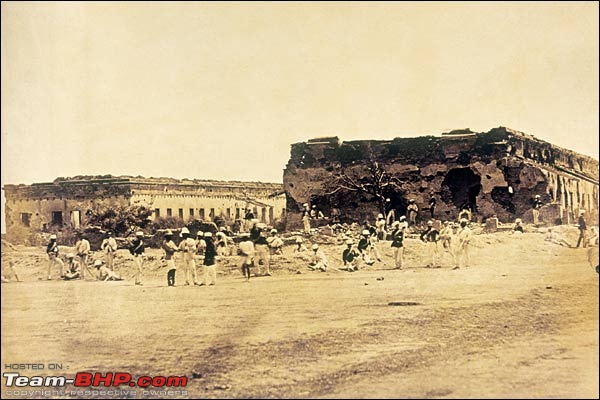 British soldiers at Kanpur 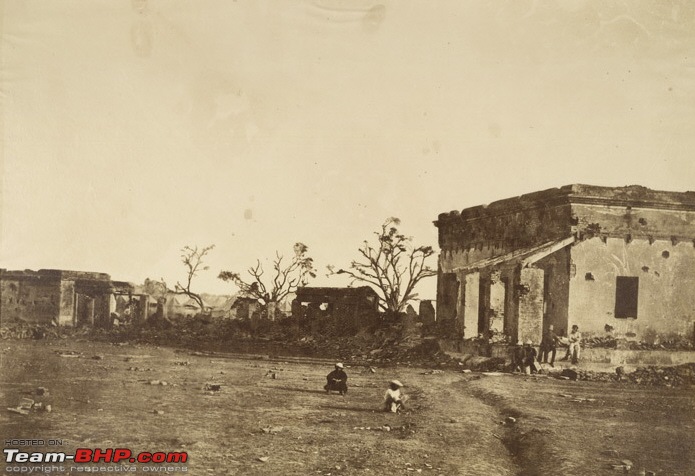 General Wheeler deployed his forces from this hospital building, Kanpur 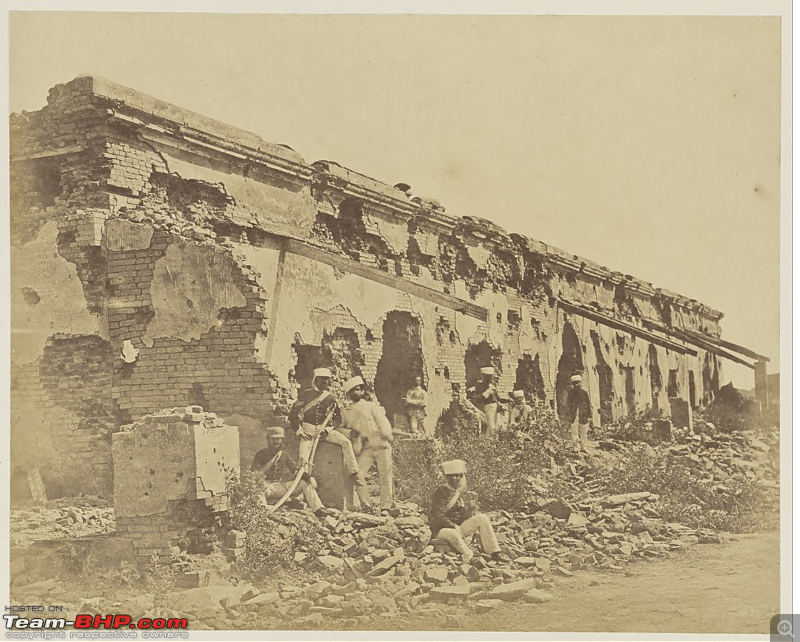 Same building, different view  Indian soldiers who fought on the British side 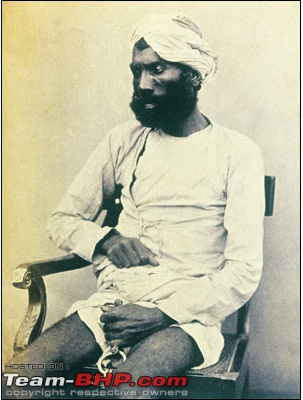 Gungoo Mehter, tried and hanged 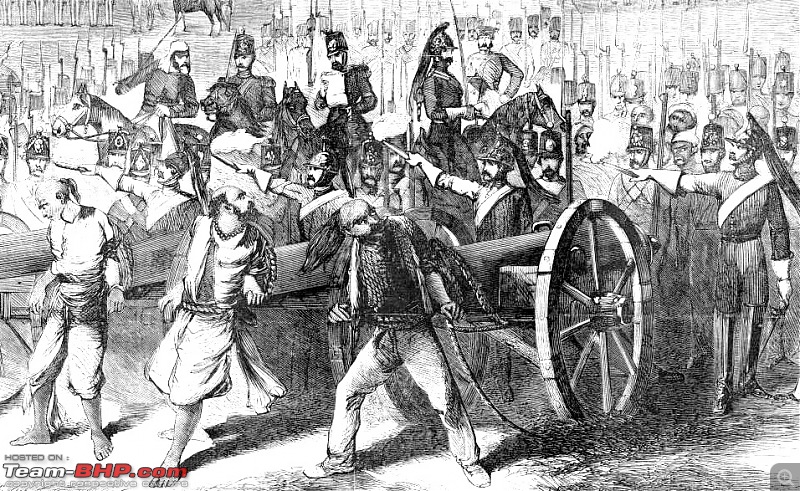 Execution by cannon 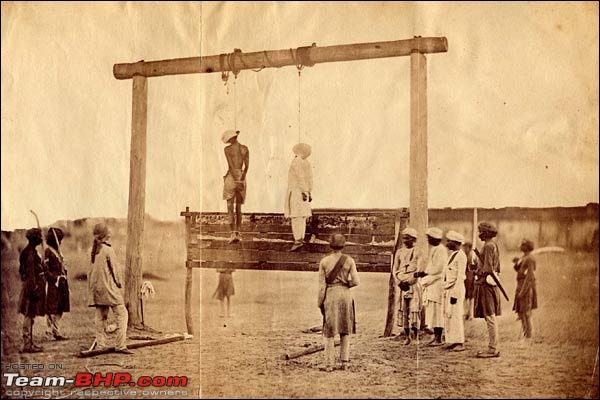 Death by hanging 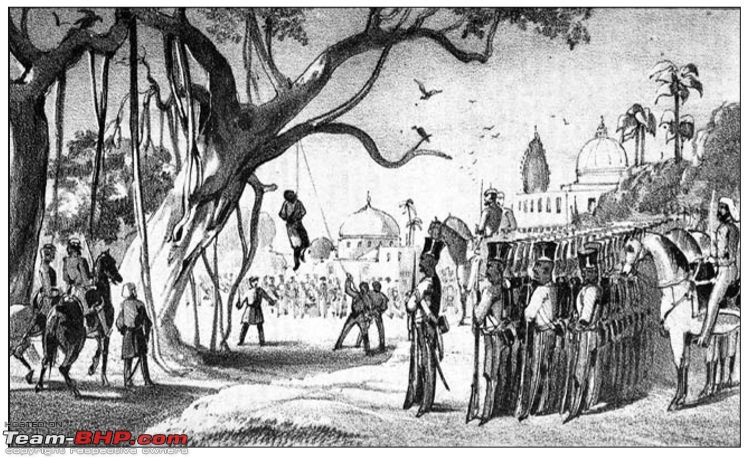 In the end, when all the looting and killings were done, the British turned their attention to the buildings. The Peshwa's personal residence? Set on fire and demolished. Walls and gates around the city? Brought down with cannon fire. Numerous temples and gardens? Demolished. The marble temple built by the Peshwa, in memory of his wife on the banks of the Ganga? The marble pried out with chisels and appropriated. The Shivling inside the temple? Destroyed. The remaining structure? Demolished. Once beautiful Kanpur was left disfigured, it's beauty destroyed, its riches looted. Whatever residents left inside the city, were stripped off everything. Kanpur was now a ghost town. Leaving behind the stench of burning buildings and rotting corpses, many of them hanging from the trees, the British prepared to break camp. Last edited by Aditya : 5th May 2020 at 06:15. Reason: As requested |
| |  (24)
Thanks (24)
Thanks
 |
| The following 24 BHPians Thank RedTerrano for this useful post: | 2himanshu, aah78, akshay81, anra, BopsKA12, C300, dailydriver, Deep Blue, Déesse, GTO, hellraizer, mh09ad5578, neerajdan, paragsachania, PM - B, pramods, Roy.S, rrsteer, saargoga, saisree, sdp1975, shipnil, V.Narayan, varunswnt |
| | #7 |
| BHPian Join Date: Jan 2015 Location: Pune
Posts: 973
Thanked: 7,642 Times
| re: Varsai to Kashi on foot : 1857-59 Once back at Brahmavart, Nanasaheb knew the end was near. Kanpur lay hardly 8 kos (~24 KM) away. Sooner than later, the British would come looking for him. As soon as they got back, a hasty family conference was organised. Still in their sweaty, dusty and blood stained clothes, they broke the news to their family. Time was of the essence. A boatman with his boat was waiting for them by the river bank. They needed to move out as soon as possible. The only safe haven for them now, was the Begum of Lucknow. The ladies were numb with shock. The just nodded acquiescence, and stepped out of the palace. Then Nanasaheb spread a shawl on the floor and gathered all the belongings which he revered the most. A conch used in his daily Pooja An extremely well preserved banyan leaf, belonging to Madhavrao Peshwa A gold arrow named Gaurishankar, used in his daily Pooja Finally he opened a sandle wood box. In it lay a few strands of hair. Many years ago, Ramdas swami had gifted Shivaji Maharaj these strands from his own beard, as Prasad. Maharaj used to worship them along with the Gods. Eventually they came down to Shahu Maharaj, who gifted them to the Peshwa. Taking a last look at his surroundings, he tied the shawl and walked out of his palace for the last time. On his way out, he remembered each and every nook and corner, where he had played as a child. This was the place where he had grown up. Today he was leaving it all behind. Putting a brave face, he willed his heart to be stone, and stepped out of the palace gates. The road to the river was lined with his subjects. Not an eye was left dry. They accompanied their ruler to the river. On the bank, Nanasaheb bowed down and prayed to the river Ganga, to grant them a safe journey. The ladies were then helped into the boat. They just sat there like mannequins, still shell shocked. His widowed mother and their sister joined them. Raosaheb and Balasaheb were next. Nanasaheb spotted the family priests, Ramchandra Shastri and Joshibua on the banks. He touched their feet, sought their blessings and climbed on to the boat. Seeing the Peshwa about to depart, an uproar went up from the crowd. They simply wouldn't let them depart alone. Numerous begged to be taken along. Nanasaheb politely refused. The family priests tried as well, but they too were politely refused. Suddenly, a young priest stepped forward and pleaded. He was an orphan, who had grown up under the patronage of the Peshwa. His religious duty demanded he accompany his master. Finally Nanasaheb relented and he got on board. The last tearful goodbyes were said. The boatman was instructed to stay back. The men would row the boat themselves. Raghoba and Balasaheb took the oars and nudged the boat into the water. Raosaheb had got a few lamps along, which they lit. The subjects stood on the shore, teary eyed, watching the light recede. When the boat had travelled some distance and reached the centre, Nanasaheb snuffed out the lamps. Then with a heavy heart he opened his shawl, and slowly offered it's contents, one by one, to the river. Tears in his eyes, he pleaded to the Gods to accept the offerings. The Gods had blessed the Peshwas for 150 years. Today, their dynasty had come to the end. He was returning back, whatever the Gods gifted him and his ancestors. They travelled in silence for quite some time and finally rowed to the other side of the river. Intentionally wanting to avoid docks, they got down. Right into knee deep slushy mud. It was extremely difficult to climb up the bank to dry land. Still, after much efforts, they somehow made it in the end. Turning back, all of them bowed down together to the river, thanking Her for the safe passage. Then they set off to a village which was visible at some distance. On the outskirts, they spotted a Hanuman temple and decided to take refuge there. A nearby well quenched their thirst. They just sat there for some time, looking at each other dejectedly. Eventually, exhausted, they fell asleep, shivering miserably in the cold. Next morning they realised they had set out without any food. Or utensils. Or money. Fortunately, Raghoba realised he had one rupee with him. He offered to go to the village and fetch supplies. He soon returned and cooked some rice. Everyone had a bath, and after offering some to Hanuman as naivedya, they had their meal. But Raghoba's excursion into the village had not gone unnoticed. By now some gossip had started in the village. Few women who were en route to the river for water, offered to gather more information. They returned and reported back the presence of 4 men and 5 women. All wearing silken and costly clothes, albeit extremely dirty. The are not wearing any jewellery but the ladies do have a naths on their nose, and there were diamonds in it. It didn't take long for this news to spread like wildfire in the whole village. Fortunately the Begum of Lucknow had sent letters all over the place, informing of the Peshwas loss at Kanpur. If anyone spotted him or anyone from his side, they were to be treated with respect and offered all possible assistance. The village mamledar was in receipt of such a letter and on hearing the news, he came down personally to the temple. Once he ascertained, it was indeed the Peshwa and his family, he swiftly made arrangements for some horses and palanquins to be brought and escorted them to his home, where a fresh set of clothes, some nutritious food and some much needed rest awaited them. While they rested, further arrangements were made, and Nanasaheb eventually made it to the Begum's palace at Lucknow. Lucknow is an old city, inhabited since hundreds of years. After the annexation of the kingdom by the British, the Nawab was exiled to Kolkata in 1856, and his second wife, Begum Hazrat Mahal, took charge. There was not much left to take charge though. Her writ ran only inside the palace walls. As the platoons started revolting, quite a few of them sought patronage at the Begum's court, which she gladly granted. Then, along with the help of the Prime Minister of Nepal, Jung Bahadur and the soldiers now in her service, she managed to drive the British out of her Kingdom, re-establishing her rule over her kingdom. When she gave sanctuary to Nanasaheb, she did it as an absolute monarch. Needless to say, this didn't go down well with the British. In pursuit of Nanasaheb, they soon turned their eyes on Lucknow. First they opened up their purse, and bribed Jung Bahadur to betray the Begum and come over to their side. Once done, they attacked Lucknow. The Begum's soldiers put up a heroic defence, but at the end of a week, it was all over. The doors were breached and the British entered the city. Not the one to give up, the Begum gathered her surviving forces, loaded her treasury on the backs of elephants and camels, and made a successful escape. The city lay open, undefended in front of the victors. By now the British had fine tuned their methods. They pulled a repeat of Kanpur in Lucknow. Killings. Loot. Massive destruction. 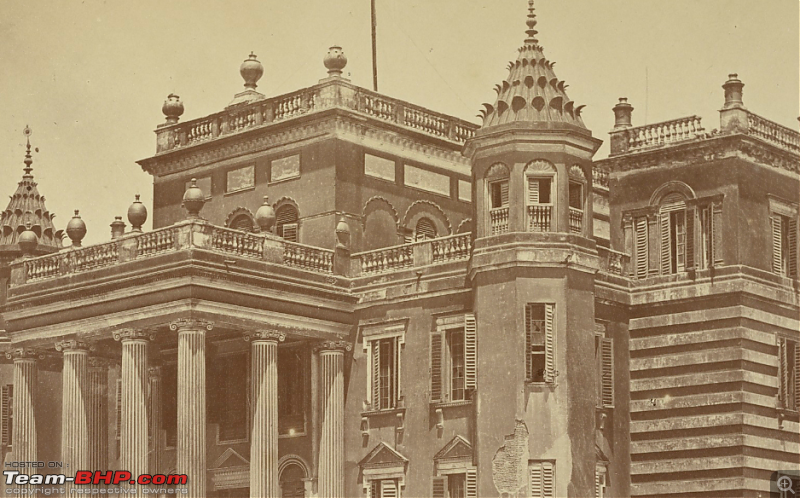 The Dilkusha Palace, Lucknow  The Chattar Manzil Palace, Lucknow. In the foreground, the Royal Boat of Awadh  Gateway and Banqueting Hall, Lucknow. 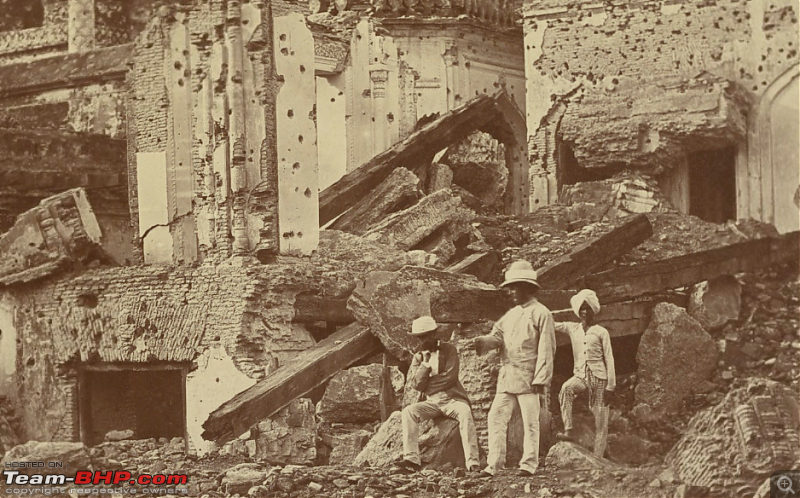 Chattar Manzil, Lucknow 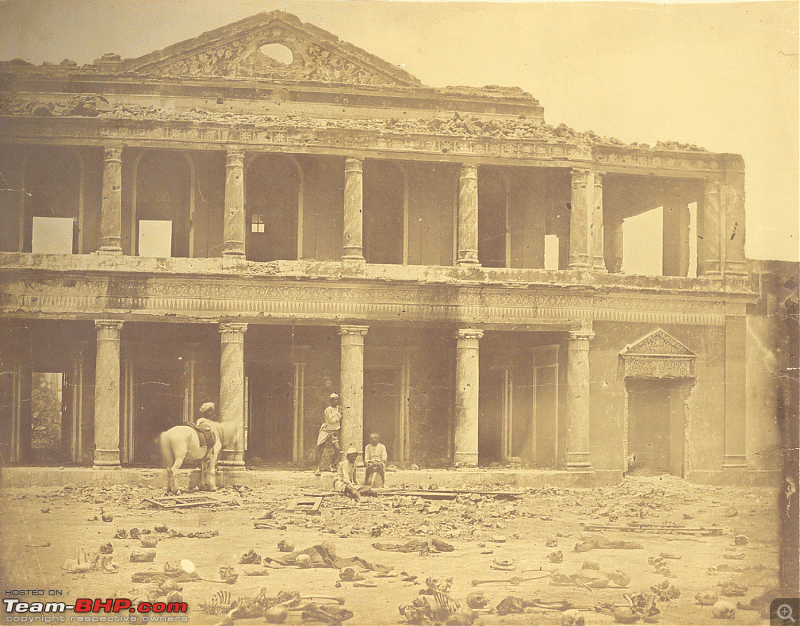 Secundra Bagh, Lucknow. 2000 Indian soldiers were slaughtered here by the 93rd Highlanders and 4th Punjab Regiment 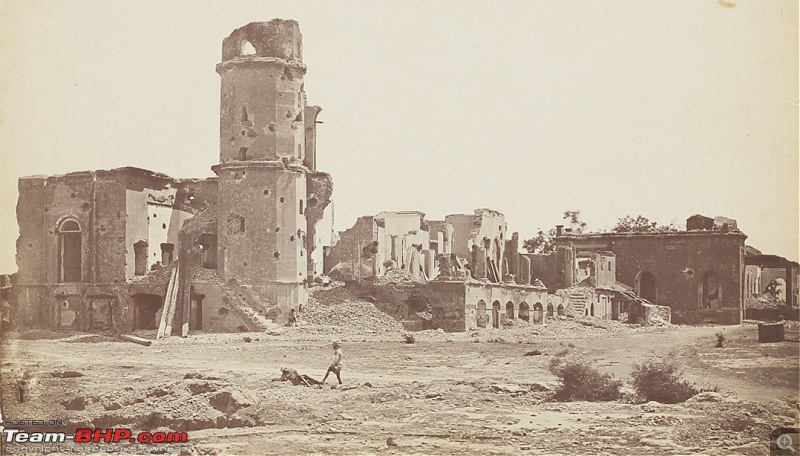 Residency building, Lucknow 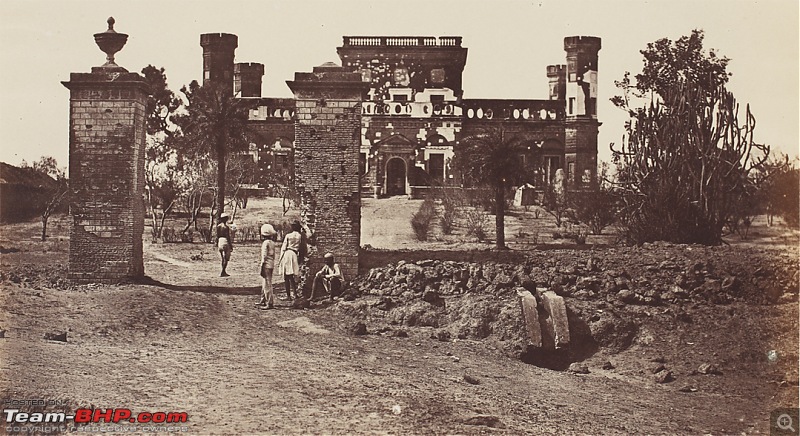 Mess house, 32nd regiment, Lucknow  Rumi Gate and Imambara, Lucknow 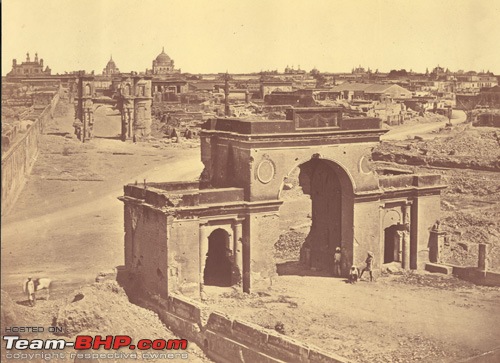 Bailee Guard Gate, Lucknow It is said, fortune favours the brave. In 1857, there was no bravery lacking on either side. Still the British emerged victorious in Kanpur. And Lucknow. And Delhi. And Bithoor. And Chitrakoot. And numerous other places. Any small sign of a rebellion was stomped out mercilessly. They left only death and destruction in their wake. Infinite amount of gold, diamonds, pearls, emeralds, rubies, ornaments, ivory. The British got all of it as the spoils of war. Fortune? Nay. Vishnubhat puts it down to superior weapons, ruthless ness and absolute discipline. Meanwhile, Tatya Tope, had escaped Kanpur into the countryside. He assembled whatever troops he could, crossed the Yamuna and entered Kalpi territory. He kept on accumulating more troops and having bolstered his numbers sufficiently, he attacked Kalpi fort. It was defended by relative less number of Britishers and they were soon overrun. The fleeing British troops were pursued and cut down. Kalpi was declared to be under the Peshwa rule. Tatya deployed his troops in the surrounding areas in a defensive position. Lalpuribua was charged with guarding the Yamuna ghats at the North. Sardar Laxman Shinde was charged with guarding the west. Rambhau and his 8000 troops were deployed in the south. Flags of the Maratha empire were unfurled everywhere on behalf of the Peshwa. Recruitment was started to train new troops. As of now, the British were busy with Delhi and Tatya was making the most of the opportunity with the available resources. In the meanwhile, Vishnubhat and his uncle had just about wrapped up in Gwalior. They were keeping themselves abreast with the daily developments all over the country. Their biggest challenge at this stage, was where to go next. Suddenly, Rambhat got an inspiration. Jhansi! They should head towards Jhansi! Rambhat had been employed in the household of the Peshwas at Brahmavart. He had come to know recently, one of his colleagues, was now a resident of Jhansi. More importantly he was well connected with the Queen! Surely he could be relied upon for help? It was decided. They would go to Jhansi. Further inquiries revealed, a Maratha sardar was scheduled to travel from Gwalior to Jhansi to visit his brother. He had a thousand troop under his command. The Godses begged his permission to tag along. Permission granted, a bullock cart was arranged for and eventually, they reached Jhansi. They were now in the kingdom of Rani Laxmibai. Last edited by RedTerrano : 30th April 2020 at 15:38. |
| |  (17)
Thanks (17)
Thanks
 |
| The following 17 BHPians Thank RedTerrano for this useful post: | aah78, BopsKA12, dailydriver, Deep Blue, Déesse, GTO, MandarMax, mh09ad5578, paragsachania, PM - B, pramods, rrsteer, saisree, samsag12, shobhit.shri, srikanthmadhava, varunswnt |
| | #8 |
| BHPian Join Date: Jan 2015 Location: Pune
Posts: 973
Thanked: 7,642 Times
| re: Varsai to Kashi on foot : 1857-59 Jhansi - The back story Chatrapati Shivaji Maharaj founded a kingdom. Bajirao I, building on this foundation, eventually turned it into an empire. At it's peak, it spanned almost 3/4 of India, including modern day Pakistan. 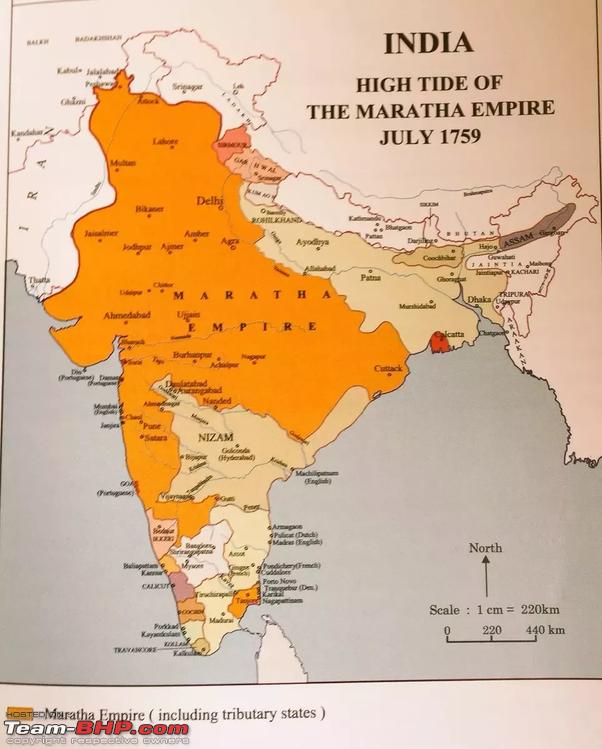 Maratha empire, maximum extent. Like all other empires, the Maratha empire followed the path of conquest - consolidation - administration. As the borders of the empire expanded, it was felt necessary to have localised power houses in the newly assimilated territory. Thus the Royal houses like Gwalior, Indore and Baroda came into existence. Mahadji Shinde, was given the responsibility to administer the northernmost region of Gwalior. Thus, he became, in GoT parlance, the King in the North !! To implement an efficient system of checks and balances, the duchy of Jhansi was granted to the Peshwa in his personal capacity. Jhansi was an old city. Prosperous, blessed with fertile soil and ample water. It was also well defended with a strong fort. The first administrator sent by the Peshwa to Jhansi was Shivrambhau Newalkar. Shivrambhau, and his descendants diligently carried out their responsibilities. After the Maratha empire collapsed, the duchy turned into a small principality. The current ruler of Jhansi was Gangadhar Rao Newalkar. He was known to be fair when it came to tax collection, and at the times of distress, he generously opened up the government coffers to the populace. To uphold the law, he did not hesitate to administer the punishment himself, if the need arose. Overall he was an excellent administrator, much respected by his subjects. Despite this, when his wife passed away, and he expressed the wish to remarry, none of them were willing to wed their daughters to him. Their reluctance was natural. His strict discipline, extended to inside his household. The people of his household lived under extremely strict conditions. It was a gilded cage. And then, there was also the matter of his strange behaviour. He was known to be a cross dresser. Not only that, every month, he would go into self isolation for 4 days, to replicate the feminine behaviour of those times, for the menstrual cycle. Unsurprisingly, no local man was willing to have Gangadhar Rao as a son in law. Rambhat, before returning and settling in Varsai, had been employed as the hom-havan incharge in the household of the Peshwa. During his stay at Brahmavart, he had trained an apprentice under him. His name was Moropant Tambe. On 19 November 1828, Manikarnika was born to Bhagirathi née Sapre, and Moropant Tambe in Kashi. She was named after one of the oldest ghats in the holy city, Manikarnika. (मणी कर्णिका = ornament/pearl for the ear) Moropant found employment at the Peshwa household and when his daughter was around 2-3 years old, he became a widower. Being an only child, with no lady in the house (Moropant hadn't remarried yet), Manikarnika or Chabeli as she was fondly known, grew up to be a tom boy. Frolicking with the palace children, which included the then young Nanasaheb, she was well loved and enjoyed a more freer hand, as compared to other girls of her times. Probably more out of convenience than necessity, her father encouraged her to read, write, learn to ride a horse, wield a sword, archery and even shooting a rifle. She is described as fair, tall beautiful girl, with a high forehead and beautiful eyes. Having unfettered access to the whole palace, she won over everyone's hearts. One day, a clerk from Jhansi, who was visiting Brahmavart on some official business, noticed her. Further enquiries were made, and Moropant was contacted. He confirmed he was indeed on the lookout for a suitable groom, his daughter having turned 14, and eligible for marriage as per the customs of those times. On his return to Jhansi, the clerk lost no time in escalating this news to the ears of the King. A mediator named Joshibua was engaged, kundalis were inspected and after confirming they matched, Gangadhar Rao officially asked Moropant for his daughter's hand in marriage. It's not everyday one gets a royal proposal. Moropant was understandably thrilled. After making some enquiries (groom was a widower, no other wives, had enough money to keep daughter happy) he agreed in principle, but put forth one single condition. Since he was a widower himself, with no other children, he would like it, if he would get accommodation in Jhansi. Also, since he didn't have a male heir, when he remarried, his son in law should bear all the expense. Gangadhar Rao acquiesced, and the Royal wedding took place. Manikarnika Moropant Tambe became Laxmibai Gangadhar Rao Newalkar. She is remembered to this day, as the Rani of Jhansi. As agreed, Moropant was granted a lavish house, replete with staff and servants. He would eventually remarry and father a son and a daughter. Immediately after marriage, the Rani realised the reality about her husband. Not only was he a cross dresser, but impotent as well. He probably tried to over compensate this by enforcing strict discipline in the household. There were strictly enforced rules about when where and how long could she could go... inside the palace !! Going out in public was absolutely out of the question. She was perpetually surrounded by armed female guards. For a woman, who had grown up in absolute freedom, this was living hell. Her husband was an absolute tyrant. This hell lasted till 21 November 1853, when Gangadhar Rao passed away. On his death bed, he called called the British resident Gordon and expressed his wish to adopt a child as an heir. Gordon was extremely fond of the King, and he approved. Anandrao Newalkar, a nephew of the King was thus adopted and named Damodar Rao. The Newalkar lineage could now continue. Some time after the adoption ceremony Gangadhar Rao passed away. Almost immediately, the British Governor General Dalhousie in Kolkata, invoked the Doctrine of Lapse and ordered Gordon to annexe the kingdom. Only the palace remained under the Royal control. Rest of the kingdom now belonged to the British. For Laxmibai, little had changed. Earlier her husband would not allow her to step out of the palace. Now, inspite of being the reigning Queen, the British would not let her rule outside the palace. Her world had been shrunk, her wings clipped, her freedom restricted to the inside of these mighty fort walls. She could not, she would not accept this. She said little, but she was fuming inside. The powder keg was stuffed. The fuse lit. The stage was set. Something spectacular was fast approaching from beyond the horizon. Last edited by RedTerrano : 30th April 2020 at 15:48. |
| |  (15)
Thanks (15)
Thanks
 |
| The following 15 BHPians Thank RedTerrano for this useful post: | aah78, Akshay1234, akshay81, BopsKA12, dailydriver, Déesse, GTO, hondafanboy, mh09ad5578, paragsachania, pramods, rrsteer, saisree, shobhit.shri, spikester |
| | #9 |
| BHPian Join Date: Jan 2015 Location: Pune
Posts: 973
Thanked: 7,642 Times
| re: Varsai to Kashi on foot : 1857-59 At the Royal palace The soldiers marched at a brisk pace. The uncle nephew duo, had to be on their toes, to keep up with them. By the time they had travelled 33 kos (~100 KM) they were exhausted. All chit chat had stopped long time back. One of the bullock carts had an un greased axle. The regular squeaking added to the irregular clippety-clop of the horses. But respite was in sight now. They had spotted their destination at some distance and picked up the pace. They arrived at Jhansi, covered with dust and thoroughly exhausted. A garden on the outskirts was deemed appropriate and they halted. A meal, some water and a little bit of rest, and the soldiers moved on. Vishnubhat and his uncle Rambhat were left behind, busy deciding their next steps. After learning Moropant was now a resident of Jhansi, they had set off from Gwalior quite enthusiastically. However, on their way, it had dawned on Rambhat, that his logic was flawed. Though Moropant had been his disciple once upon a time, today he was the father of the Queen. He discussed this with Vishnubhat and both agreed, it might be a good idea to consider other options. They set off exploring the city and came across some Brahmans. Pleasantries exchanged, further enquiries revealed, the recommended place to stay would be the residence of Keshavbhat Mandgavne. Keshavbhat having mastered the Vedas himself, was a huge patron of Brahmin pilgrims and scholars. Address obtained, the Godse duo turned their feet towards the concerned house. They were welcomed with open arms in the huge mansion. Housing accommodations discussed and finalised, they had dinner chit chatting with their host. Upon bringing themselves abreast with the latest developments, they mutually agreed, they would not contact Moropant. The next week was spent exploring the city and talking darshan at numerous temples. Vishnubhat notes thus: Jhansi is one of the beautiful and neat places in Hindustan. It is dominated by an ancient fort, which sits on top of a hillock, west of the city. Though old, the fort is extremely strong and well maintained. A deep moat surrounds it and a drawbridge provides the only entrance. The fort is quite expansive and can easily accommodate 4000 people. The main administrative building is five storied and centrally located. It is octagonal in shape and smaller bungalows for different departments surround it. The spacious field on it's western side is interspaced with lot of tamarind trees and is typically used for military parades and drills. The fort walls are very wide, having strong bastions at regular intervals. The bastions have dungeons at their base. The central palace is very beautiful and spacious. The interiors are dotted with carpets and various seating arrangements. Ventilation is well regulated with wide windows. Potted plants are strategically placed everywhere. The palace is seven storied and at the southern side, two scores of steps lead you down to a huge pool of water, which is surrounded by a huge, extremely well maintained garden made up of flower beds, grape vines and numerous trees like mango and guava. Some distance away, there is a luxurious bungalow called Shankar Killa Outside the fort lies the city. The roads are narrow and congested. Some parts like Koshtipura and Halwaipura are full of tall beautiful mansions. At the centre of the city lies the Bhide garden which has 5-6 huge wells. Numerous smaller gardens beautify the city. The houses are multi storied with sloping terracotta tiled roofs. Almost every house has its own well. A huge pond has been dug outside the southern gate of the city. A tall Mahalaxmi temple lies at it centre. Being the kul-devi of the royal family, the temple is looked after extremely well. Almost eight months of the year, one needs a small boat to reach the temple. Only during the summer season, when the water level goes down, can one walk up to it. Numerous temples are dotted all over the city, prominently dedicated to Ganpati and Vishnu. The Govt appoints priests and provides for their salaries and upkeep of the temples. People of Jhansi are kind and helpful. Many of them have become prosperous thanks to their industrious and artistic nature. Carpets, silk cloth and brass utensils from Jhansi are famous all over. In fact I think a God fearing man can be happy only in two places. Pune in the South and Jhansi in the North. After thoroughly exploring the city for a week, both of them went calling on Moropant Tambe the next morning. Seeing Rambhat, Moropant himself came forward, and escorted him to a seat with honour. Refreshments were brought in and both ex colleagues spent some time reminiscing about the old days. Eventually the subject turned to their presence in Jhansi. Once he came to know of their situation, he suggested they meet the head priest of the Royal family, one Lalubhau Dhekre. With a reassuring promise to also have a word with the Queen, he bid the uncle nephew duo goodbye. On visiting Lalubhau, they were pleasantly surprised to learn their visit was already awaited. After all, ex hom-havan in charge of the Peshwa household, indicated a certain high level of knowledge and as such it had it's perks. It so happened, the Queen was currently planning a Yagna, to tone down the bad times and a scholar of Rambhat's stature would made a welcome addition to it. On the day of the Yagna Vishnubhat and his uncle made it to the venue, where he being a junior, was seated at the back, while Rambhat was requested to join the senior Brahmins. The Queen arrived, with her adopted son, followed by Moropant Tambe and the Yagna commenced. Vishnubhat, who had tutored under Vinayakshastri Joshi in Varsai, had merely read about this Yagna. Seeing it unfold in front of his own eyes, excited, he was following the proceedings quite closely. Suddenly he realised, there was a slight discrepancy in the procedure. Dare he? Should he actually dare and have the discrepancy clarified? In front of all these seniors? All these scholars? His own uncle? The Queen Herself? Finally, following the dictum कुचेष्टा केल्याशिवाय प्रतिष्ठा वाढत नाही (without criticism, there is no prestige), he stood up and in a very respectful manner, voiced his question. There was stunned silence. The Yagna ground to a halt. All eyes were upon him. Everyone seemed to wonder, who is this upstart? Finally, giving his question a thought, Bhaiyya Upasni concurred, Vishnubhat did have a valid point. Almost instantly, Vinayak Bhatji begged to differ. Some discussion ensued. Like spectators at a tennis match, everyone's attention seemed to follow the speakers as they laid out their opinions. In between some even threw snarky glances at Vishnubhat. Finally Vishnubhat cleared his throat and clarified he was speaking based on the knowledge he had learned from two granths; Mayukh and Hemadri. If, somehow, copies of these two could be procured, they would have clarity. A junior priest was sent to fetch the volumes in question. On his return, they were studied thoroughly. Vishnubhat, had indeed been right !! Bhaiyya Upasni beckoned him forward, and indicated he should sit behind him for the rest of the Yagna. Vishnubhat closed his eyes, thanked God as well as his Vinayakshastri Joshi and did as instructed. He was happy, he had proven himself to be a good pupil. Only if his Guruji were here !! Thanks to his intelligence and the courage to speak out, in an instant, Vishnubhat had had been promoted from an unknown Brahmin to a senior Brahmins assistant. That too in front of his peers and the Queen Herself! The Yagna went on for four days, and Vishnubhat assisted daily. At the end, he received a dhoti worth 12 rupees and a पागोटं (headgear) worth 20. But most priceless was an audience with the Queen Herself! She told Rambhat, his nephew had shown a promising spark. He would have a bright future, if he agreed to stay in Jhansi under the royal patronage. Rambhat bowed down his acquiescence. Vishnubhat was immediately told to assist in the next Yagna. His performance there was reported back to the Queen and the next day, the uncle son duo got the official invitation to relocate their quarters to inside the fort. On their arrival, they were shown to their accommodations. A few sets of brand new silk dhotis and shawls were provided. The beds were comfortable and came with a warm covering. The clerk in charge informed them, they would be drawing a monthly stipend of thirty rupees. Vishnubhat busied himself, many a times assisting, sometimes officiating some of the numerous religious ceremonies going on. Eventually, he became part of the palace. Staying in the palace, Vishnubhat could observe the Queen at close quarters. She kept a disciplined time table. Get up at dawn. Work out at the gym. Ride a horse. Sometimes an elephant. Breakfast around seven. Maybe a siesta for an hour. Then a bath. Then some time in praying and performing Pooja. Then meet the courtiers and the people who were staying under the royal patronage. Lunch around noon was followed by another siesta. At three to the court to oversee and supervise administrative matters. Sometimes dressed in a snow white saree indicating her widowhood, many a times in a male attire, complete with a sword. Every Tuesday and Friday, she would visit the Mahalakshmi temple, accompanied by her son. On her every visit, she was always accompanied by her personal, all women bodyguard. After the British annexed Jhansi, they let her retain control over the fort and the treasury. A monthly pension was paid out to her. Besides this, there was no other source for revenue. All taxes and revenues went into the British treasury. Despite this, the Queen took measures to ensure none of her subjects suffered. And the people reciprocated in kind. Many of the palace staff, who had been in the royal service for long, voluntarily took a pay cut, to help stretch the available resources. And then the harassment started. They suddenly stopped the pension for a few months. The reason? Your ex husband owed us some money. She petitioned to be allowed to go to Kashi so she could tonsure herself as per the scriptures. Permission was refused. She petitioned cow slaughter be banned in the city. It was rejected. Since ancient times, revenue from two villages was earmarked for the maintenance and upkeep of the Mahalaxmi temple. Both were annexed along with rest of the kingdom. Petitions and pleas to reinstate the status quo fell on deaf ears. The Queen was infuriated more and more at each stage. Soon enough she commenced a secret correspondence with her childhood friend. Nanasaheb Peshwa. Both of them were in the same boat. They began plotting, how to get rid of the British. Something was brewing. Soon it would come to fruition. Last edited by RedTerrano : 30th April 2020 at 16:15. |
| |  (17)
Thanks (17)
Thanks
 |
| The following 17 BHPians Thank RedTerrano for this useful post: | 2himanshu, aah78, BopsKA12, dailydriver, Deep Blue, Déesse, Gansan, GTO, mh09ad5578, naren_gs1, paragsachania, pramods, rrsteer, saisree, shobhit.shri, V.Narayan, varunswnt |
| | #10 |
| BHPian Join Date: Jan 2015 Location: Pune
Posts: 973
Thanked: 7,642 Times
| re: Varsai to Kashi on foot : 1857-59 Spark and Ignition One morning, Gordon, the local resident of Jhansi, accompanied by other British officers demanded an urgent audience with the queen. We have come to know that tomorrow, there will be huge trouble. Your Highness needs to make arrangements to protect us ! Until the troubles are over and the British rule is reinstated, you must take charge of the administration !! The Queen took one long look at them and answered Earlier, when I asked you to hand over the administration to me, you refused. Now you think there is going to be trouble and you might be killed, you want me to take over and protect you? A meeting was organised in Kolkata with the Governor General, to decide the fate of my kingdom. Then you did not bother to even invite me to attend. My husband beseeched you on his deathbed, not to annex the kingdom. You did it anyway. My son was adopted when my husband was alive. After he passed away, you told me about some new rules, where adopted children were no longer rightful rulers. So you took away my kingdom and left me with this solitary fort. As per my religion, I sought permission to travel to Kashi. You outright refused. After doing all this, you have the gall to come to me, begging I take over and protect you? Why should I? In fact if I did, the Indian rebels will come and wipe me and my family out. Better it's you than me. And the Queen walked out. The Britishers were stunned by the reply. Eventually they gathered their belongings, including all the official government records, which they had brought along to hand over to the Queen, and beat a hasty retreat to their quarters. As per schedule, at ten in the morning, all the Indian soldiers in Jhansi rose up in revolt. Gunfire and shouting could be heard everywhere. Soon, arms, ammunition, tents, treasury was appropriated and the whole cantonment was torched. Any Britisher seen, was cut down. Then they headed towards the fort and asked for the Queen. Audience granted, they assembled before Her and declared their loyalty to the throne. The Newalkar family had ruled justly and wisely over the years, and people hadn't forgotten. Immediately, riders were dispatched all over the kingdom, to transmit an official announcement. The British had been evicted. The flag of the Newalkar dynasty flew over the fort once again.  Royal standard of Jhansi, Newalkar dynasty Immediately the Queen ordered her troops into defensive positions. Production of guns, cannons and gunpowder was ramped up. The old guard was restored, the old loyalists reinstated. By now Tatya Tope had conquered all the region adjacent to Jhansi, all the way to Kalpi and its neighbourhood. For almost eleven months only Indian flags flew over those territories. In the meanwhile, the British re grouped. Reinforcements were called in from outside India. Fresh white troops were supplemented by regiments of Indian soldiers from Madras. The Nizam of Hyderabad pitched in five thousand of his own. So did the Shindes. And Holkars. And Gaekwads. And Ghorpades. Primed for combat, this juggernaut rolled towards Jhansi under the command of (then) Captain Hugh Rose. Starting off from Bombay, Rose led his armies north, via Khandesh, Satpuda, Mhow and Indore, ruthlessly crushing whatever pockets of resistance he encountered. The vanquished were summarily judged and executed. In Bundelkhand, he turned his guns on the tiny principality of Banpur. Banpur, lay near the Vetravati (Betwa) river, a mere 100 KM from Jhansi. They were the first to be hit. The now combined British and Indian army lay siege to Banpur. The Banpur army put up a tough fight but at the end of a week, they were overwhelmed by the sheer numbers of the enemy. The city wall was breached, but the survivors, including the king, managed to stay a few steps ahead and fled to the the numerous ravines and gorges in the countryside. For now, they were safe. A messenger was dispatched to Jhansi. Such a news was inevitable and expected in Jhansi. The Queen had used her time quite well. Troop strength had been bolstered. Defences had been tightened. The soldiers were rested and fresh. Bigger cannons had been poured and moved on top of all the bastions. Production of cannon balls, muskets, gun powder had been ramped up under the supervision of one Lalu Bakshi. Anticipating an extended siege, tremendous amounts of grain, puffed rice, gram, ghee, sugar, flour, rice etc had been stocked up. A massive community kitchen was set up in the Ganpati temple premises. Falling short of funds in the treasury, the Queen had ordered all her personal silver utensils, lamps, plates, dishes and water containers from the palace, to be taken to the royal mint, to arrange for sufficient coinage. Mail was regularly exchanged with Tatya Tope. As and when required, he would throw in his forces in the defence of Jhansi. Along with these human efforts, the Queen ordered for a Yagna to beseech the Gods for divine help. Everything which could have been prepared for, was done. All possibilities which could have been foreseen, were discussed and planned for. Jhansi was primed and ready. The Queen was ready. Now they awaited the enemy. Soon enough, the enemy arrived and Hugh Rose set up camp 2.5 kos (~7.5 KM) from Jhansi. Tents were pitched, cannons were positioned, pickets were deployed and a messenger was dispatched to Jhansi. He was asked to wait, while the Queen and her advisors considered the correspondence. The letter was short. The Queen, her Prime minister, her father Moropant, Lalu Bakshi and four others named below, are hereby ordered to present themselves in front of Hugh Rose at his camp in two days time. Unarmed. Signed - Hugh Rose. Jhansi would not go gently into the good night. That much had been decided right at the onset. A short conference was held to draft an appropriate reply. The motive behind the summons is unclear. No guarantee of safety has been given. As per protocol, if required, the Prime Minister can visit along with his bodyguards. The Queen being a lady, will not go to meet any strange men. Don't like it? Tough luck. Signed - The Queen of Jhansi. The same messenger took back the response. Pondering over the maps, Rose sent a detachment of forces under the command of two officers towards the north east of Jhansi. They were instructed to camp around 25 kos from Kalpi, and were not to let Tatya Tope approach Jhansi under any circumstances. Rose split and spread out rest of his forces in a well organised siege around Jhansi. To instigate panic among the civilian populace, Rose had circulars posted amongst all the villages in the surrounding territory. It brazenly proclaimed Jhansi is under siege and on the verge of destruction. When the British troops enter Jhansi, pillage and plunder for three days has already been officially sanctioned. Also, no male between the age of five and eighty will be spared. All will be slaughtered. It is advised not to aid Jhansi in any way, and stay far away from it. Anyone found or suspected of doing so, will me executed. You have been warned. In the meanwhile five trustworthy riders on swift horses, had exited the Jhansi gates and streaked towards Kalpi. They carried with them a letter addressed to Tatya Tope, updating him of the latest developments and urging him, the time to throw in his forces to the defence of Jhansi had arrived. Tatya's forces from the outside, the Queen from the inside. Sandwiched between them, the enemy could be crushed. Tatya conveyed his assurance and the riders returned. The die was cast. No quarter would be sought, nor given. Both sides would fight till the end. Last edited by RedTerrano : 30th April 2020 at 16:27. |
| |  (13)
Thanks (13)
Thanks
 |
| The following 13 BHPians Thank RedTerrano for this useful post: | aah78, Akshay1234, BopsKA12, Deep Blue, Déesse, GTO, mh09ad5578, paragsachania, pramods, rrsteer, saisree, V.Narayan, varunswnt |
| | #11 |
| BHPian Join Date: Jan 2015 Location: Pune
Posts: 973
Thanked: 7,642 Times
| re: Varsai to Kashi on foot : 1857-59 Explosion Day 1 Vaishakh had commenced, and Greeshma rutu had set in. The summer heat could be felt now throughout the day. Scouts brought news that numerous tents had cropped up on the the open plains at the South of the city. That evening, Vishnubhat climbed up on to the top of a high bastion wall, and was shocked to see small campfires lit all around the city. Flat plains surrounded the city on all sides and the terrain was almost denuded of all trees, so visibility was excellent. But somehow, going by the silhouettes he spotted, he got a feeling, the number of people was disproportionate to the fires lit. Fresh reports were received at night, which confirmed this. The spies estimated a fighting force of around sixty thousand. The Queen herself, then climbed the walls to inspect the vista. Taking in the sight, she traversed the wall, instructing adjustments in the cannon placement. Sharp shooters and auxiliary soldiers were appointed. Soldiers armed with carbines were placed all over the city walls. Defences at all the gates were strengthened, reliable people were put in command. Day 2 Having encircled Jhansi, the British now tried to move ahead, and build up fortifications, so that the city walls were in range of their cannons. The Jhansi soldiers waited patiently till they were in their range, while tracking them with their cannons. Once they were, they unleashed hell. This went on all day, from all the sides. The British suffered heavy losses. Try as they might, they were always driven back. And the day wore on. Day 3 Hugh Rose was an extremely capable warrior. He had been observing the fire pattern and realised Jhansi had an Achilles heel. The cannons could traverse only a certain angle. In a few places, the adjacent guns failed to overlap, resulting in blind spots. Whether because of wrong placement, or the geography. Didn't really matter. Rose had all the information he needed. In the dark of the night, one by one, he sneaked in his guns in the blind spots and built fortifications. At the end, he had four guns encircling the city. On his command, one gun started firing. The cannonballs flew in an arch and landed on the stone walls. The defenders were flummoxed. How did they enemy get within range. The Queen herself came out to assess the situation. How had no meaning now. It was fait accompli. She quickly reorganised her defences. More guns were called in from the other side to tackle the enemy. The soldiers were just about fine tuning their retaliation angles, when Rose ordered the other guns to open up as well. It was pandemonium. The Queen went numb with shock. Swiftly recovering, fresh orders were given. She and her commanders were all over the place. Cannons realigned. Uninterrupted supply of shot and powder ensured. A little coaxing here, a reprimand there. Retaliatory fire was kept up. The Queen could not help but wonder, was this the beginning of the end? Time would tell. No time to think about that now. Rose noticed his firing was not having the desired effect on the strong city walls. They simply refused to crumble. He then ordered his gunners to increase the elevation. He was targeting inside the city walls now. There was havoc and panic amongst the civic populace of the city. A cannonball would land on the city streets, explode and kill 5-10 people, injuring 25 more. There was no place left to run. Nowhere to hide. Some cannonballs would land on the roofs of buildings, came crashing down, through the floors, and eventually when they did explode, they would either flatten the whole structure or cause immense damage to property as well as lives. Most of the buildings were made of wood or had wooden beams and pillars. Fire spread everywhere. Fortunately, anticipating such a scenario, the Queen had already organised a fire brigade. They rushed all over, trying to douse out the flames. All shops were closed. Civilian life had ground to a halt. The enemy was at the gates. Abject terror gripped the populace. Besides the city, even the fort was suffering the brunt of the onslaught. Almost all buildings inside the fort had gaping holes on their roofs. The holes continued down through the floors, and at the bottom, signs of fire, destruction and death. The cannonballs were stuffed with nails, blades, knives and assorted sharp objects, which were expelled in all directions when the ball exploded, causing immense destruction within the closed confines. These were the latest development in artillery warfare, their existence only heard till now. A few balls had failed to detonate. Vishnubhat, notes, they were weighed to be 60 manā (~ 2220 Kg) each. Burnt buildings with gaping holes, blood, destruction, the stench of death and the wails of the dying. Destruction was everywhere. But the Queen bravely kept up here defences and the retaliatory fire killed numerous British soldiers as well. As of now, the battle was still evenly balanced. Day 4 Around 6 in the morning, the gun on the southern bastion fell silent. The British had concentrated their artillery and simply would not let any man near it. Undeterred, the Queen ordered a temporary fortification to be built at some distance and placed a substitute cannon there. Her best marksman armed with a telescope was assigned and the firing resumed. By the time the British realised this and retrained their gun, the substitute gun managed to take out the British marksman. Immediately, soldiers were rushed in, on the south bastion and both guns rained fire and destruction, wiping out the British fortification. The ace gunner won lavish praise and a silver bracelet weighing 80 tolas from the Queen Herself ! The firing continued into the night. There was no respite. Not much visible during the day, except their smoky wake, at night, they looked abjectly scary as well as beautiful at the same time. Approximately the size of a small ball upon firing, the fireball gracefully arched up in the sky, increasing in size as it drew closer. The whole night sky was lit up with fiery arches, accompanied by sound like thunder. Incessant firing made even the cannon mounts glow red hot, as they belched obscene amounts of smoke every time they ejected a ball. (Vishnubhat uses the term चेंडू फळी, i.e. ball and bat while describing the cannonballs. Apparently cricket was familiar to the Indians even in those time !) Day 5 - 6 The battle continued without a pause. Fate could not make up it's mind yet. The pendulum continued to oscillate. Sometimes the defenders had the upper hand. They focused their fire and managed to silence some of the attacker guns. Then the attackers shored their losses, recovered and retaliated, managing to silence the defender guns. Thus it went on, unabated. Day 7 At sunset, the eastern gun fell silent. Not only were the soldiers killed, the enemy even managed to knock down the fortification. Bricklayers were sneaked in at night, hidden under dark blankets. Helped by similarly disguised soldiers who made a human chain, slowly but surely, they rebuilt the fortification. Fresh soldiers with ammunition were deployed, and the gun commenced firing once again. They British, not being able to see at night, were taken unawares and their gun was knocked out of action. Day 8-9 One week into the battle, both the sides were evenly balanced. But Hugh Rose had the most valuable weapon of those times up his sleeve, when it came to siege warfare. He had at his disposal, an excellent telescope. Powerful lenses enabled him to scope all activity on the fort with precision. He re-oriented his guns and commenced firing. Their target, Shankar killa and the water tank on the fort. The first shot, wiped out 6-7 Brahmins, who were filling up water for the troops. Seeing their mangled bloody bodies lying near the water, nobody dared to replace them. The British guns kept up and in a few hours, the Jhansi soldiers started feeling the shortage of water. Fighting under the hot sun, unable to quench their thirst, they became more and more frustrated. Once they realised the cause, they trained the cannons on that one particular gun, which had been targeting Shankar killa with deadly accuracy. The blasted it simultaneously with all their fury and soon enough, the enemy gun was silenced. Soon, water lines were restored and the soldiers enjoyed a brief respite. But not for long. Suddenly, an ear shattering explosion. Smoke and dust filled the air. Eyes were smarting, ears hurting. Everyone went numb with shock. It took some time for the smoke to clear. Destruction lay in front of their eyes. An artillery factory had been set up on the open grounds in front of the palace. They worked non stop. As soon as two manā (~74 Kg) of gunpowder was manufactured, supply lines stocked it up, along with the shot, in the dungeons under the bastions. An enemy shell had landed smack in the middle of the factory, and ignited the gunpowder, resulting in a massive explosion. The mangled bloody remains of the people working there could be seen strewn all over the place. 30 men and 8 women were killed outright. 40-45 more lay screaming in pain, limbs and organs ripped off, bleeding heavily. Enraged, the gunners stepped up their firing. Instructions and war cries filled the air. Coordination between the guns was fine tuned. Carbines, cannons, bugles, horns, humans all added to the cacophony. Dust and smoke was everywhere. The British too responded in kind. As night fell, blood red fireballs could be seen streaking from both sides. Numerous soldiers as well as civilians in the city lost their lives. Some due to exploding cannonballs, some crushed under collapsing structures. People desperately tried to save their lives, hiding under whatever shelter they thought to be safe. But there was no safety to be found. Death and destruction was everywhere. The soldiers worked in shifts and got some respite. But for the Queen and the commanders, the strain was starting to be felt. They had been at it, almost nonstop, for a week now. Every minute, a new problem to be solved, soldiers to be encouraged, supply and food lines to be kept up uninterrupted. How much longer could they pull on? When would Tatya Tope arrive? The stress was becoming unbearable. When everything else fails, there is always God. The Queen was religiously devout. After consulting Lalubhau Dhekre and Bhaiyya Upasni, she ordered a Yagna be organised in the Ganpati temple. Any divine help would be most welcome at this stage. Day 10 At sunrise, scouts on top of the wall spotted clouds of dust at some distance. The Queen rushed in with her telescope. It was Tatya Tope! He had finally arrived at the head of 15 thousand cavalry and artillery ! He had travelled through the night and reached near Jhansi in the middle of the night. By daybreak he was spotted and intercepted by the two officers dispatched by Hugh Rose, just for such an occasion. Everyone on the fort, as well as beyond the city walls, was acutely aware, the outcome of this clash would decide their fate. The guns fell silent. All eyes focused on the battle brewing at some distance. Both the sides were evenly pitched and the fighting fierce. The din of the battle could be heard in Jhansi. Smoke and dust billowed up into the summer sky, interspaced with sounds of carbine and cannon fire. The defenders were joined on the walls by the civilians and everyone awaited the outcome with bated breath. The fighting went on for some time, and suddenly, Tatya's forces could be seen fleeing ! Immediately Rose ordered detachments into hot pursuit. In the end Tatya's army had been utterly routed. They left behind arms and ammunition, which was appropriated by the British. A massive shout of victory swelled up from the British camp. It was the toll of doom for the defenders. Unable to believe their eyes, ears and luck, some even collapsed to the ground in shock. A wave of despair crashed over everyone. But sometimes, despair is a funny emotion. Some let go. Some are cranked up even more, their adrenaline flowing. The defenders were of the latter type. Knowing very well, they would be slaughtered on defeat, they rose back up with fury. The guns which had been temporarily silenced, began blazing away with heightened fervour. Jhansi would not fall that easily. They would make it as difficult as possible for the British. Bring it on!! Not to be left behind, and rejuvenated by their recent victory, the British replied in the same coin. The guns blazed away throughout the night. Day 11 Sunrise saw the Queen dressed up in masculine attire, a sword tied to her waist. As always, she was busy visiting each and every gun placement, ensuring the defence was kept up properly. Now the British trained all their guns on the palace. A few cannonballs landed on the palace corner, which had a glass roof built over a small Ganpati temple inside. The glass collapsed and the cannon balls fell, further crashing the numerous Lucknow mirrors decorating the walls, as well as the glass chandeliers and lamps, shattering all of them to tiny pieces. The ball fell down further, smashing open holes three floors below, and finally exploded. The massive explosion shattered all glass and fragile items inside. The roof and windows were no match for the cannonballs but the walls were a different story. Built with strong stones, cemented by a mixture of lime and jaggery, they managed not to crack or collapse, even if they had gaping holes in them. The whole day, the firing continued. Seeing Tatya lose must have affected her heavily, but the Queen did not let it show in her demeanour. She continued as if nothing had happened. Her regular inspections on the walls and bastions were interrupted. A scout brought the news that the Britishers had spent almost two and a half lakh rupees till date on the siege of Jhansi, but victory was still not in sight. Their stocks of armaments were running dangerously low. The officers had decided to give it their last best shot tomorrow, failing which they would wind up camp. Hearing this, a tired but satisfied smile spread on her countenance, boosting her strength and valour. That night, she had a good night's sleep after many days. Day 12 Unable to sleep Vishnubhat was strolling on the sixth floor terrace at dawn. The sun was just below the horizon, but it had become light enough to see. And what he saw, shocked him. Thousands of labourers, with bales of grass on their heads were scurrying towards the south tower. Behind them, protected by the bales, were thousands of British soldiers. The moment they reached the city wall, they started piling the bales on top of the other, making a stair kind of structure. Once completed, the soldiers quickly scaled it and reached the top of the wall. Furious fighting broke out between the soldiers trying to get in, and the defenders desperately trying to keep them out. In the end, overrun by sheer numbers, numerous defenders fell. The survivors fled. Within 10-12 minutes it was all over. Thousands of British troops had entered the city. By the time the messenger rushed panting and woke up the Queen, there was little she could do. She went to the window, gazing at the scene in shock.She could not believe her eyes! She had gone to sleep hearing she just might have survived the onslaught. Here she was now, seeing with her own eyes, the enemy wrecking havoc inside the city. What a difference a few hours can make! Stunned, the Queen took only a few moments to make sense of what her eyes were seeing. Swiftly, she swung into action. Her personal bodyguard numbering two and a half thousand was assembled. Dressed in male attire, sword bare in her hand, commanding the formation from the centre, she ordered the fort gate opened and rushed to the south tower in the city. The southern gates had been flung open and the British troops were rushing in. Swords glistening in the morning sun, the Queen and her body guard rushed in to plug the breach. Blades swooshed down, spraying fountains of blood. The air was full of shouting and the clanking of weapons. The skirmish lasted a minute or two. An order was shouted, the British rushed behind obstacles, sheathed their swords and brought out their guns. Around this time, a trusted servant of many years came to the Queens side and informed her, it was not just the southern gate. All the city gates had been flung open. This was a battle they would never win. The correct option was to retreat to the safety of the fort. Gritting her teeth, the Queen nodded assent and all of them rushed back. The fort door immediately slammed shut behind them. The British did not bother following them. They went on a killing spree in the city. Some went "hunting". Any male between 5 and 80 was either shot or cut down. Others went about setting fire to everything. When it reached Halwaipura, a massive wail went up in the air. People who had taken shelter in that area ran in all directions to save their lives. But there would be no mercy today. They were pursued by British troops and butchered. Many died mid flight, never knowing what hit them. Some tried hiding in narrow lanes. Others tried their luck inside some ruins or a cupboard. Some shaved their facial hair and tried to escape in a woman's attire. Many streaked towards the Bhide garden at the centre of the city. By the time the British arrived there, thousands had already gathered. They begged and pleaded. They were civilians, not soldiers. Please spare us for the love of God. Fortunately for them, the commanding officer took pity and ordered his troops to stand down. The garden gates were locked, with strict instructions to not allow anyone come out, or enter. A total of around twenty thousand men, women and children were enclosed in the garden quaking with fear. And then there was the pillaging. Enter the property. Loot anything gold, silver or valuable. If a male is found inside, and he hands over the valuables swiftly, he was spared. Of course, swiftly was a relative term. If he delayed in the soldiers opinion, he was dragged outside, his dhoti tied around his own neck and he was beaten and tortured. Once he disclosed the location of the valuables, he was let go. Of course being let go did not ensure safety. In case he was encountered by a different set of soldiers, he was shot for not having any valuables. Floors were dug up. Walls knocked down. All in the quest of gold and silver. Amongst all this loot and destruction, not a single woman was harmed, killed, raped or tortured. As per the Captain's orders, every white soldier was accompanied by two native soldiers. They were under strict instructions and freedom to shoot the white soldier if he as much as touched any woman. The white soldiers would enter, and if a woman was spotted, stand at a distance and tell her to hand over the valuables. Most complied out of fear. Then making enquiries about the neighbours, they would move on to the next house. But this did not mean women didn't lose their lives that day. Many fearing harm, jumped into wells and committed suicide. Others died clinging to their husbands, sons and fathers, throwing themselves between their loved ones and the gun. Seeing the bullet wasted on the woman, the soldier would simply fire another one and kill the male. This went on till sunset. At dusk, the British organised pickets in the city and the remainder returned to their camps. On returning to the fort, the Queen sat numb in her private quarters. No one dared go in her presence, or disturb her. Her advisors and commanders continued to flesh out different ideas in hushed tones. A few hours later, she emerged and signalling her associates to follow, went on to the terrace to survey the situation. Once prosperous Halwaipura, was a mere smouldering husk. Flames and smoke reached up from it, high into the sky. Despite the summer sun, heat from it's flames could be felt even at a distance. A dissonance of wails and shouts reached their ears. People in the city were desperately trying to flee for their lives. Thousands of gunshots followed by screams could be heard. The Queen was moved to tears, seeing the plight of her subjects. She stood there for a few minutes. Then she wiped her face, returned inside and gathered all her advisors. She appeared calm and composed, but her voice shook a little as she spoke. She, the Rani of Jhansi, had failed her people. It was for her, that her subjects were made to undergo untold misery. She was to blame. She had made up her mind. She would blow herself up, along with all the ammunition stored in the dungeons. Anyone interested in dying along with her, were welcome to stay back. Others were welcome to escape the fort at night. The audience was shocked into silence! All they could do was just stare back at her. Then slowly, the trusted servant of many years, who had convinced her to turn back, slowly stepped forward. Taking the queen's hand he led her back to a seat, and sat her down. Taking advantage of his years of service and age, he started speaking in a soft, but a firm voice, like a father to his daughter. Your Highness, please stop blaming yourself. You are overstrung with emotions. This is all God's will and there is nothing humans could do against it. All things happen as per destiny. Suicide is a sin. We suffer Karma in our life, for the sins of the past. It would be sheer folly to add a major sin to the tally in this lifetime. Whatever is thrown our way, we must bear it with fortitude. On top of it, you are a brave warrior. A Kshatriya never ever thinks of suicide. Lets plan properly and escape under the cover of darkness. Tatya has been defeated but still alive. Let's team up with him and vanquish the enemy together. Even if we die fighting, we will attain heaven. Please calm down, rest, have some food and start preparations. The speech delivered in loving tones had it's desired effect. The Queen, saw the folly of her actions and touched the feet of the advisor for helping her avoid making a blunder. Night approached. Dinner was taken in silence and soon it was time for goodbyes. The Queen met each and every person, who was staying the at the fort under her patronage and wished them good luck. Everyone got some money or clothes as a parting gift. The doors parted a bit and these people left the fort, followed by non combatants such as maids and servants. Sneaking into the city in total silence, everyone went their own way and Vishnubhat and Rambhat made their way to the Mandgavne residence. The day Jhansi city fell, it was a new moon. At midnight the north door of the fort was stealthily opened. A group of around 200 of reliable and trusted commanders and soldiers emerged on horseback. Also accompanying them were the Queen's father, Moropant Tambe and her advisors. The Queen herself, sat astride her favourite horse. Her adopted son sat behind her, tied to her waist with a silk dhoti. Everyone was armed and carried sufficient gold and silver coins with them. Besides the sword, the queen carried a dagger and a gun on her person. At the centre of all the horses, was an elephant carrying the Royal treasury in a steel box on it's back. A soundless prayer and the convoy moved out. As they descended, slowly their pace picked up. The had entered the city. They urged their steeds into a gallop. The city gates were wide open. They streaked towards them. At the last moment, some British sentries spotted them, raised an alarm and attacked the convoy. Hearing the commotion, the British camp outside was awake in an instance, and not knowing what was happening, they started firing their cannons. A savage skirmish ensued between the sentries and the convoy. Many were cut down. Suddenly, from amidst all the crowd, two horses separated and streaked away together. Immediately, the rest of the convoy, dispersed in all directions. Precious time was lost saddling and preparing the horses. Eventually the British took up pursuit. But it was obvious at the onset, they were already too late. The escapees had a head start of almost one kos (~3 KM). Eventually they gave up and returned back to camp. In the darkness of the night, having no clue, who had actually escaped, the British kept firing the cannons till day break. The two horses swiftly made their way in the direction of Kalpi. One carried the Queen and the crown prince. The other, one of her armed maids. Riding like the wind, checking over their shoulders every once a while, they eased off a little bit only after confirming the enemy had given up the chase. At daybreak they reached a small village on the periphery of Jhansi. A brief halt at the house of a trusted servant, who had worked at the palace in the olden days. As the prince ate, the two ladies rested. Meal done, back on the horses. No food, no water, very little rest. They relentless rode on. After a long and hard drive for almost 12 hours, they reached Kalpi. For now, they were safe. Last edited by RedTerrano : 30th April 2020 at 17:04. |
| |  (13)
Thanks (13)
Thanks
 |
| The following 13 BHPians Thank RedTerrano for this useful post: | aah78, Akshay1234, BopsKA12, Deep Blue, Déesse, GTO, mh09ad5578, paragsachania, pramods, rrsteer, saisree, V.Narayan, varunswnt |
| |
| | #12 |
| BHPian Join Date: Jan 2015 Location: Pune
Posts: 973
Thanked: 7,642 Times
| re: Varsai to Kashi on foot : 1857-59 Upon seeing the Godse duo, safe and sound, Keshavbhat Mandgavne heaved a sigh of relief. The discussed the situation and exchanged notes. The biggest problem facing them was how to survive the slaughter promised by Hugh Rose at the onset. Only one of the three days had passed. Fortunately, their host had a plan. Right in front of the Mandgavne residence, lay an abandoned mansion. The entrance to this mansion lay through a narrow lane. Few years earlier, a painter had built his small house right at the entrance of the lane. Because of this, only regulars and old timers were aware of the existence of the property. On the back side of the mansion, was a huge courtyard, surrounded by thick high walls. Inside the walls, numerous concealed cubby holes, large enough to accommodate several people had been built. This practise had existed in the olden days, where robbery had been common in the Bundelkhand region. The courtyard would be dark even during daytime, thanks to the overgrown trees. There wouldn't be much breeze either, but that was far better than getting shot. The Godses were relieved on hearing this. It felt like they would survive after all. They finished a frugal meal and went to the terrace to survey the surroundings. The whole city looked like a a ghost town. Fire raged everywhere, dispelling the darkness. People could be seen wailing, sitting around the corpses of their loved ones. Some were scavenging around, trying to find something to satiate their hunger. The fire in Halwaipura raged on unabated. The fire brigade organised by the Queen was nowhere to be seen, the people manning it, probably lay dead somewhere. The flames rose high to the heavens, and the swaying breeze, once a while, spread the fire to the neighbouring mansions. Vishnubhat records he hardly slept that night. The fear was very very real. At dawn the next day, the Godse duo, their host and his son Damodarbhat assembled in the courtyard to cross over and hide in the abandoned mansion. Suddenly two British soldiers entered their home. Wasn't it too early for the slaughter? The sun hasn't risen yet, wondered Vishnubhat. He glanced behind him and noticed the Mandgavne father son duo had vanished inside the house. Was this it? Would it all end this way? Vishnubhat notes he was drenched with sweat. Shivering all over, he went numb with fear. Fortunately his wits kicked back into action and he prostrated himself in front of the soldiers. His uncle taking cue, followed him. Sahib, he pleaded, we are residents of Varsai, near Mumbai, and as such, we are British subjects. Please do not kill us. We have come here on a teertha yatra and are just passing through. We are poor Brahmin pilgrims and have no clue about the situation in Jhansi. Surprisingly the soldiers believed them. Probably they picked the difference in the accent. The soldiers pushed them aside and entered the house looking for valuables. Right in front of them lay Vishnubhat's baggage. Hidden inside it, was a pouch containing 250 rupees. This was all the Dakshina they Godses had earned till date. The soldiers took it. And left. On their departure, the Mandgavne duo came out, and all of them rushed to the mansion across the street. It turned out, they were not the only ones to think of this abandoned mansion. Almost all their neighbours were there. They ran round the perimeter, hunting for the hidden openings to the cubby hones. The Mandgavnes entered one. Seeing it full the Godses carried on. Finally, they found one and snuck inside. It was a bit crowded, but they were too afraid to further expose themselves to the outside. The sun had come up and they could already hear raised voices, shots and screams. Quivering with fear they stay put. Around noon, Vishnubhat felt absolutely dehydrated. Cooped up in the close confines on a summer day, the heat had taken it's toll, and he was precariously close to fainting. Water was already provisioned for. In the middle of the abandoned courtyard, lay a well. Someone had put a coil of new rope and a bucket next to the well. All he needed to do, was step out, to quench his thirst. But dare he? He reasoned, it was worth trying, and with a silent prayer, he stepped out. He let down the bucked, pulled it up, and drank his fill. He darted back to his cubby hole, wanting to get to safety before he was spotted, but in the rush lost his orientation. Calling out to his uncle was simply out of the question. Panicking, he ran the perimeter of the wall like before. Only if he could find an entrance. Time was of the essence. Finally he stumbled upon one and with a sigh of relief rushed inside. The cubby hole was a small one, designed for perhaps two people. And two ladies were already inside. Seeing his indecisive face, they stood up and hastily beckoned him inside. His relief was short lived. Upon entering, he realised the space was too cramped. Unable to sit down, they three of them stood, their bodies pressed against each other. Vishnubhat notes, amongst all the dangers he underwent during his teertha yatra, this was the most precarious. Here he was, a married male of 30, in physically close confines with two strange ladies. One of them was around 18, in the bloom of her youth. The heavy heat meant all of them sweated profusely, making their clothes cling to their bodies. But the fear of impending death was such, that any other thought but survival did not enter his mind. They spend several hours cooped up together, and as it grew dark, slowly emerged from their hiding position. Others had stepped out as well, and his uncle, not knowing what happened to his nephew, having spent the whole day praying for his safety, was overjoyed to see him safe and sound. Sneaking back home, they were about to sit down for dinner, when two ladies from their neighbouring house came calling. It was the Karkare wife and daughter in law duo and they tearfully explained how both their husbands had been killed and their bodies were still lying in the courtyard. Could Mandgavne please help them with the last rites? All men stepped out. They gathered 7-8 neighbours and went to the Karkare residence. Having no proper wood for the pyres, they made do with the planks and beds they found. Upon completion of the rituals, Mandgavne offered shelter and food at his residence, and the ladies tearfully nodded assent. The next day, last of the scheduled slaughter, was spent like before, hiding in the cubby holes. Apparently, the schedule had a strange effect on the British soldiers. They became more savage. Of all the days, most people were butchered on the last day. Britishers roamed the streets, weapons drawn. Any native seen, was immediately cut down. Lot of the residents tried hiding in the bales of hay. The British simply put a match to it. Anyone trying to escape the pyre, was shot dead immediately. Others jumped into wells, to save their lives. For the British, it was shooting fish in a barrel. Eventually, people who came up for air, found the British waiting, their guns ready. Vishnubhat writes about one of their neighbours, a priest name Agnihotri. True to his name, he had just finished the ritual yagna when two Britishers, entered his premises. Pushing him aside, they entered the interior, looking for valuables. As per the norm, the fire had not been doused out, but merely covered with a plank. Not knowing this they kicked it aside, expecting to find something worth their effort, but were greeted with an ash coloured substance. Thinking something might be buried underneath it, they tried sifting it by their bare hands, with predictable results. This infuriated them so much, that they shot the priest out of hand. And his brother. And his son as well for good measure. As if a compulsive need to complete their quota was driving them, the Britishers went crazy hunting for the natives. Houses were thoroughly searched and the residents killed. Dharmashalas and temples were raided. Basements, cupboards, farms, huts. All were raided. The British left behind a wake of dead bodies. Vishnubhat estimates, during those three days, from Jhansi alone, the British looted wealth worth crores of rupees. Gold, silver, diamonds, emeralds, pearls, coral. All went into their pockets. Any and every metal pieces was appropriated. So were clothes. And carpets. And silken pillow covers. And curtains. Over the generations, the rulers of Jhansi had built up a huge library. All kinds of religious tomes could be found in it. Even this was raided. The tomes were wrapped in thick, high quality cloth. The cover was ripped out of each and every book, the pages thrown out of the third floor window and the cloth taken away. Even musical instruments were not spared. The skin membranes were discarded and the metal parts taken away. For Vishnubhat, the biggest sin was raiding the Mahalaxmi temple. Her ornaments and Pooja paraphernalia were made of gold and silver. All of it was taken away. Finally, the sun set on the third day. Last edited by Aditya : 6th January 2022 at 12:38. Reason: Typo |
| |  (15)
Thanks (15)
Thanks
 |
| The following 15 BHPians Thank RedTerrano for this useful post: | aah78, alphadog, BopsKA12, Deep Blue, Déesse, dpat17, Dr.AD, GTO, mh09ad5578, paragsachania, pramods, rrsteer, saisree, V.Narayan, varunswnt |
| | #13 |
| BHPian Join Date: Jan 2015 Location: Pune
Posts: 973
Thanked: 7,642 Times
| re: Varsai to Kashi on foot : 1857-59 After spending three days under immense stress, a wave of relief washed over the populace. The official slaughter had ended. On the fourth morning, Vishnubhat sat on the steps in front of his house, when the native regiments from Madras entered the city. They were on the lookout for brass copper and any other metal utensils they could lay their hands on. Knowing the people had hidden their utensils in wells, they carried with them, big hooks attached to ropes, which they used to easily fish them out. As they entered the Mandgavne residence, Vishnubhat greeted them politely and requested them for the latest news. Readily, they obliged. The first 3 days were reserved for the white looters. The next 4 days were reserved for the native soldiers in the employment of the British, as well as the soldiers from the princely states, who supported them. Lots had been drawn to determine the sequence. Today it was the Madras regiment, to be followed by the Nizam of Hyderabad's soldiers tomorrow. The only saving grace was that no native was allowed to kill anyone. That had been a prerogative reserved only for the white soldiers. Vishnubhat liked to chew tobacco once in a while. Sadly he had ran out. He asked for some and the soldier gladly replenished his stock. Rummaging through the house, confiscating whatever utensils they could find, they wished him a good day and moved on to the adjacent house. The Mandgavnes had buried their cooking vessels in the garden, but they dared not dig them up. The whole day soldiers in twos and threes from the Madras regiment continued to visit. Thus the whole day was spent in enforced fasting. In the pillage, even the Gods had not been spared. All metal moortis had been stolen. Fortunately, the Mandgavnes had a Shaligram. After a bath the Mandgavnes and Godses got some flowers and did a Pooja, offering their heartfelt thanks to the Gods, for saving their lives. Whatever Jowar and Bajra grain they had, had been buried along with the cooking utensils to keep it safe. That was dug up, ground and cooked. The meal was served on banana leaves. They were just about wrapping up the rudimentary dinner, when a few neighbours came calling. Together they set out to explore the city. The streets were strewn with corpses. Fire raged everywhere. Whatever survivors left, were sitting stunned. Some were wailing, mourning the loss of their loved ones. Scared and disgusted, they hurried back to their homes. The fifth day, they soldiers belonging to the Nizam of Hyderabad entered the city. The Madras regiment had been hunting for metal. Today the hunt was on for cloth. Any and every kind of cloth. Torn dhotis, pitambar (yellow dhoti, typically worn while performing Pooja), handkerchiefs, blankets, bedsheets, pillow covers, mats, mattresses, carpets, all were fair game. An elephant was brought in. The soldiers would enter the houses, grab what they could, and dump the loot on it's back. They went about methodically, stripping all houses bare. Having nothing left to be looted, Vishnubhat sat on the steps stoically observing them. Ever the soft spoken guy, he had a friendly conversation with whatever soldiers possible. He managed to talk most of them, into parting with some tobacco ! The sixth day saw the natives from the British army descend on the city. They brought in bullocks and loaded whatever grain they could find onto their backs. Jowar, Bajra, Pulses. Whatever they could lay their hands on, was taken. Grain was typically stored in earthen pots and vessels. They were emptied and the containers smashed. The seventh day was open house. Anything which could be carried away, was taken. It was free for all. Nothing was left behind. Vishnubhat notes, even the pulleys and ropes used to draw water from the well were not spared. Bananas, mangoes, flowers, wooden chairs. All gone. By now, whatever grain was buried, had all been consumed. Water was the only means of survival. Thousands starved in Jhansi. The populace was stripped bare of almost everything. Describing all the agony and horrors, Vishnubhat notes with irony, the British were implementing the same exact measures described in Shukraniti to bring your enemy to it's knees. The eighth day dawned and the British went around the city announcing, the populace had nothing to fear. They were now under the protection of the British. An order was issued to come and dispose off the corpses of your loved ones. This was easier said than done. Lots of families had been totally wiped out, not a single male left behind to perform the last rites. All such corpses were piled up in heaps, at road intersections.Whatever wooden doors, windows, blackboards, noticeboards, swings, cribs, bannisters, handrails could be found, all was used to light the communal pyre. Funeral pyres went up all over, making the city look like one huge crematorium. And the unforgettable stench. The breeze spread the stench of burning bodies all over the city and made people retch with revulsion. A huge pit was dug outside the city and the corpses of thousands of bullocks, camels, elephants, dogs, horses, cows and buffalos were dumped and covered with soil. Thousands of people were pressed into service, tasked with cleaning the streets. All houses, mansions and shops right from Halwaipura to Koshtipura were still ablaze. The Queen's fire brigade was brought back into service to douse the flames. Now that the city was clean, the British set up shops. All kinds of goods were up for sale. People dug up last of their monies and purchased few grain and utensils. Those who couldn't went hungry. Mandgavnes and Godses pooled in five rupees, bought supples and had a full meal after many days. Outside the city, the British held an auction. The Scindia of Gwalior picked up the lot containing pack animals such as elephants, camels, horses , all useful for warfare. The also picked up an enormous brass swing, belonging to the Royal palace of Jhansi. This huge masterpiece was decorated all over with delicate and complicated filigree. Similar lots were picked by the Nizam of Hyderabad and other princely states. Like birds of carrion pick a carcass clean, Jhansi and it's people had been picked clean. All gold, silver and gems were stolen by the British soldiers. Combined with the auction, they made an enormous amount of money, over and above the expense they incurred during the siege and battle of Jhansi. The civilian populace was robbed bare and brought to it's knees. The city cleaned up and brought under the British administration. Meanwhile the hunt for the Queen's people commenced. Any and every person who had helped her in any capacity was a target. Anyone found was hanged in the town square. Most of the soldiers and commanders who had escaped Jhansi the night the Queen got away, were still being hunted. Those who were traced, were brought back to Jhansi and hanged. The Queen's father, Moropant Tambe, had been seriously injured during the flight, his thigh almost cleaved clean by a sword. He still managed to escape, grabbing on to the horse for dear life and somehow able to sit upright. At dawn he reached Datia, a known British stronghold. Moropant was of two minds. Dare he continue on? That way, his chances of survival were slim. He had lost a lot of blood already. In the end, against all his instinct, he abandoned the horse and approached a paan seller. The paan seller was initially shocked to see a man covered in blood, limp towards him. Moropant gave him some gold coins and pleaded to save his life. The seller took him home, and promptly went to the king of Datia. Royal soldiers were dispatched to apprehend Moropant, who was handed over to the local British resident. He was then dumped into a Doli, brought back to Jhansi, and hanged. Numerous others were hunted down and faced a similar fate. Now that the horrors had officially ended, the time had come to move on. Vishnubhat sat down and evaluated their situation. Since they left home, they had earned around 400-500 as dakshina, which were sufficient to clear the loans. But all that money was gone now. After months of pain, hardships and terror, all he had to show for it was worried elderly parents back home, and not a single rupee to his account. Forget losing money, a few times he had been even close to losing his life! Had it been even worth it? The Godses discussed their predicament daily. At the end of a fortnight, they decided, it was high time they moved on. They reasoned, they were in the north anyway. Whatever Dakshina they had earned was all gone. That was in the past and they couldn't change it. The sensible thing to do now, would be to visit Kashi. Till date, all they had got for their efforts was trouble. They had failed spectacularly to earn money. Why not earn some punya instead? But this was easier said than done. Kashi lay quite far away and it would take days to reach there. Meanwhile they still had to solve problems like food. Brainstorming together, they realised, they could try their luck at Brahmavart. The British had restarted the mail service. Vishnupant dispatched a letter home to his father, telling him both of them were safe and sound and he need not worry. Between the two of them the Godses had managed to hide three rupees. That would have to do for their immediate journey. Also, on his person, tied around his waist, hidden under the folds of his Dhoti Vishnubhat had managed to secret away, two gold toe rings. At the end of all these months, after all the hardships and close calls with death, this was all the worldly profits they had. But whatever was done, was done. Taking it in their stride as Karma they prepared for their journey. Tattered dhotis were draped around their waist. A disintegrating pouch was tucked in at Vishnubhat's waist. It contained an iron nutcracker and a small zinc box, which contained some tobacco, with the three rupees hidden inside it. A dhoti torn in half made up their headgear. A rectangular piece torn from it, was hung as an uparna on their shoulder. A torn banian covered their upper torso while an earthen pot dangled around their waist, tied to a rope fashioned out of creepers. The neighbours and the Mandgavnes had come to see them off and seeing them in this condition left everyone with wet eyes. These two Brahmins from far off Varsai, had come to their city. Not only had they been robbed of everything, they had almost died. Keshavbhat Mandgavne accompanied them to the city gates. There, after extracting a promise, they would revisit him on their way back from Kashi, he hugged them goodbye. The Godses wiped their tears, turned around, and set off on the road to Kalpi. Last edited by RedTerrano : 30th April 2020 at 17:35. |
| |  (18)
Thanks (18)
Thanks
 |
| The following 18 BHPians Thank RedTerrano for this useful post: | aah78, Akshay1234, akshay81, dailydriver, Deep Blue, Déesse, dpat17, Dr.AD, Gansan, GTO, paragsachania, pramods, Roy.S, rrsteer, saisree, Sunny_team_bhp, V.Narayan, varunswnt |
| | #14 |
| BHPian Join Date: Jan 2015 Location: Pune
Posts: 973
Thanked: 7,642 Times
| re: Varsai to Kashi on foot : 1857-59 Dodging trouble, Jhansi - Chitrakoot One evening the uncle nephew duo reached a hamlet. Kalpi lay 6 kos away. The set up camp on the outskirts, under some tamarind trees. Dinner cooked and consumed, they settled for the night. A huge racket startled them awake. Dawn was some time away and it was still dark. They noticed hundreds of Indian soldiers on horseback, in full gallop towards Kalpi. Not knowing what had happened, but deciding discretion was the better part of valour, they hastily gathered their belongings and joined the mad rush. The horrors of Jhansi were still fresh in their minds. There was no point in pushing their luck and risking their lives. Eventually they learnt, Tatya Tope and the Rani of Jhansi had engaged the British forces at Charkhari. The fight was bitter and bloody. In the end, the British forces prevailed and the routed Indian soldiers were rushing to Kalpi. Lack of proper nutrition for days, plus the exhaustion of travelling on foot under the summer sun, had left the Godses' energy levels depleted. They could not run for long. As the sun peeped over the horizon, they spotted a well by the roadside and decided to halt. They had just about had a drink when suddenly, five horsemen pulled over to a halt. Still on horseback, one of the riders asked the Godses who they were, in a commanding tone. Despite the male attire and dusty countenance, Vishnubhat immediately recognised who it was. It was the Rani of Jhansi herself ! He immediately stepped forward, bowed down and identifying themselves, offered to draw water from the well, for her and her companions. The Queen politely declined and got down from the horse. You have suffered enough already. I do not wish to put my people into any more trouble. Her dejected tone moved Vishnubhat close to tears. Respectfully he moved back, and the Queen drew water from the well. Thirst quenched, as she was mounting her horse, she warned the Godses, it was unsafe to stay on the road. The British were most probably in hot pursuit and would surely reach Kalpi soon. In fact, it would be best, if they avoided Kalpi altogether. When the Godses unravelled their plans of Kashi yatra and explained how they had been robbed of everything, Kalpi being their only existing option, she sighed, wished them luck and rode away. The Godses rested a while and followed her, reaching Kalpi around 9 in the morning. Entering the city, Rambhat spotted one of his acquaintances from Brahmavart, and hailed him. Pleasantries exchanged, he suggested a massive tent put up for Brahmin travellers, on the banks of the Yamuna. There they were sure to find arrangements for Pooja and rest. Thanking him, they made a beeline to the place. A refreshing bath in the river, meals taken, they set off to explore the city. From his description, it can be inferred, Kalpi impressed Vishnubhat. He writes about the Kalpi fort, protected by strong high walls on three sides. The deep and wide waters of the Yamuna guarded the forth. On the western side, an open ground separated the fort from the city. Engaged mainly in sugar trade, the city was prosperous. Tall mansions and wide roads were to be seen everywhere. The nearby river ensured ample water to all the wells dotting the city. Beyond the city lay a vast expanse of flat land. This was the traditional war zone. He mentions the 84 domed monument built over the graves of 84 generals who lost their lives during some war in olden times. The next day was spent earning enough Dakshina to enable their further journey. By evening they started trying to figure out a way to cross the river. On enquiring, they were strongly advised against it. The British had already reached the banks of the Yamuna, which had become a battle zone, with the Indian defenders on this shore, and the British on the other. The situation was fraught with danger. This news froze their blood. They seemed to have come out of the frying pan into the fire, all for the want of accursed money. The precarious situation was discussed and in the end they could see only one light at the end of the tunnel. The Rani of Jhansi. If anyone could help them now, it was her. Despite the late hour, an audience was sought and granted. The strain was palpable on the Queen's face. Even then, she gave them a patient hearing. Summarising their situation swiftly, she broke them the bad news, as gently as possible. They were already too late. Chances were high, the battle would break out tonight itself. In case things soured, it was very much possible, residents of Kalpi would share the same fate as those of Jhansi. Their best bet lay a few 4 kos (~12 Km) upstream, where the Queens soldiers were guarding a lesser known pass. Once across the river, they would do well to avoid all main roads, and make it all the way to Brahmavart via off beaten paths. Time being of the essence, the sooner they set off, the better. Giving them a few rupees, she wished them well, and brought the audience to a close. The Godses thanked her profusely, bowed, and took their leave. Unbeknownst to them, it was too late already. By the time they went back to gather their meagre belongings, they could hear the now familiar sound of cannon fire at a distance. Death and destruction had followed them from Jhansi, all the way to Kalpi. They mentally re lived the horrors from the past, the wanton killings, the bloodshed, the wails, the mangled corpses and the stench of death. Their legs turned to jelly and they fell down in fear. The Godses were reliving hell, all over again. Having faced defeats in a row, over the months, the Indian troops had lost their morale. Having seen the British savagery, many of the seasoned commanders as well as troops, had fled into the countryside. Many of them changed their appearance and took up new professions. Tatya and the Queen had no option but to bring in fresh recruits. It takes time to turn novices into soldiers, and time was one commodity they severely lacked. Also the ranks of these freshers, were mainly made up of petty criminals and thieves. Having heard or seen the British savagery, no person in his sane mind was willing to take up arms against them. On the other hand, the British were riding high on their successive string of victories. Delhi, Lucknow, Jhansi. They had emerged victorious. All over the country they had conducted successful mopping up operations, stamping out the rebellion. The whole country had felt the might of their "justice". From almost losing it all, they were on the verge of reclaiming everything and emerging on top. They fought with renewed fervour. Kalpi lasted a mere 3 days. As the signs of defeat became more and more obvious, the new recruits abandoned their posts, entered the city and started looting. Rioting and violence ensued. Prosperous merchants were targeted, dragged onto the streets, beaten up and made to give up their wealth. Shockingly, even women were not spared. There were incidents of barbaric behaviour at the hands of these recruits. Houses and offices were plundered. All loot was dragged out into the streets, filled in wagons and taken away. Sacks of sugar were split open, and the contents were strewn all over the streets. Seeing the writing on the wall, Tatya Tope and the Rani of Jhansi escaped and vanished into the surrounding forests, along with whatever soldiers still loyal to the cause. And then, the British entered the city. They repeated what they had done in Kanpur, Jhansi and numerous other cities. The let loose a reign of death, terror, loot and destruction on Kalpi. Vishnubhat and Rambhat were petrified. As the city fell, numerous people started fleeing the city. The Godses followed suit. Remembering the Queen's instructions, they eventually made it upstream. To their horror, they found out, hearing the fall of city, all the boatmen contracted to carry the troops across, had fled into hiding. Quaking with fear, they stood rooted to the spot. In front the river blocked their way. Behind them, they could already hear horses approaching fast. Was this it? Was this the day they would meet their maker? Fortunately, it turned out to be an Indian commander and his troops. They swiftly pulled over. Vishnubhat approached the commander and hastily explained the situation about the missing boatmen. He sent soldiers to find and bring them back. On their return the commander pleaded, cajoled, bribed and even threatened and finally they relented. The soldiers and the Brahmins safely made it across. Stepping out of the boat, Vishnubhat felt a wave of immense relief wash over him. They had made it ! They had survived !! They had escaped hell !!! A silent prayer to the Gods, and still remembering the Queen's advise, they set off using a mountain path. It was the summer season, and progress was slow and cumbersome. One day as they were resting under the welcome shade of a tree, some well built thieves suddenly appeared out of the foliage. Brandishing an axe, they gruffly demanded Godses hand over all their valuables. Vishnubhat pleaded, they were poor pilgrims with no valuables, but to no avail. The thieves held them and performed a search of their possessions. The search revealed the money given by the Queen. Whatever the thieves thought worth taking, they took. Just before they left, they turned around and gave back Vishnubhat, five rupees. For your pilgrimage, they said, and vanished the way they had appeared. Dejected, the Godses sat down. They had reached Jhansi overcoming severe difficulties. By then they had managed to earn enough Dakshina to pay off their debts back home. In an instant this had been taken away from them. They had starved but still survived. Kalpi had been a repeat of the same sad saga. They had managed to escape the horrors and now in an instant, they were robbed of all their possessions. Were they paying the price for some sins in their past life? Vishnubhat couldn't help but wonder and was extremely depressed. A few minutes spent in silence made them realise, there was no point feeling bad. What was destined, always happened. That's how Karma works. They got up, brushed themselves off, and started again towards Brahmavart. A few days later, they reached spotted a Shiv mandir at Kheeragadeshwar/Ksheergateshwar and entered. While taking darshan Vishnubhat notes, he could feel the stress, misery and sadness leave him. Suddenly he felt fully at peace. Perhaps it was the effect of being in the presence of the Lord? Perhaps the fact, they would be blessed with Ganga darshan in a short period of time? After all, Brahmavart lay only 3 kos (~9 Km) away. Whatever it was, it was a different Vishnubhat, who exited the temple. With uplifted spirits, they resumed their journey, and around 4 in the afternoon, they reached Brahmavart. Instead of searching for accommodations they chose to go first to the river front. Both bowed down reverently to mother Ganga, and had a refreshing bath in her cool waters. Vishnubhat notes, he felt like he was not only washing away the dust and grime of the journey, but the sins of all the lifetimes. Deciding to spend the night on the river bank, they called it a day in a nearby temple. Next morning at eight they reached the Bhide wada and called upon an old acquaintance, Mamasaheb Vaknis. Pleasantries exchanged and acquaintance renewed, Mamasaheb suggested Chitrakoot. A few Brahmins from Brahmavart were scheduled to travel there for a Yagna. Mamasaheb was confident, considering Rambhat's seniority, they would be more than happy to have him join them. This way they stood an excellent chance to earn Dakshina which would be enough to see them all the way to Kashi. The plan was approved, the Brahmins located and everyone set off to Chitrakoot. At Chitrakoot, they put up at Haripant Bhave, and old acquaintance from Brahmavart, who also originally hailed from Varsai. Yagna completed, Dakshina earned, they were contemplating their future plans, when the news arrived, that Captain Whitlock and his two regiments had arrived in the vicinity of Chitrakoot, and was camped 2 kos (~6 Km) away. The ruler of Chitrakoot Dham, one Madhavrao, was an adopted child, and being underage, was guided by the Prime Minister, Radhakishan Pardeshi. When Indian soldiers started to rebel, knowing well about the doctrine of lapse, Radhakishan was heavily inclined against the British. When some regiments of Indian soldiers sought refuge, he gladly accommodated them. On hearing this, the resident collector and other British officers fled Chitrakoot. Immediately Radhakishan took over the rule, and ramped up production of arms and ammunition. Whitlock sent a summons the next day, ordering Madhavrao and Radhakishan to present themselves unarmed at his camp. Radhakishan refused outright and strongly advised Madhavrao to do the same. More out of naiveté than bravado, Madhavrao ignored his advise, presented himself in front of Whitlock and was immediately arrested. On hearing this, Radhakishan packed up whatever treasury he could, armed his soldiers, and escaped to a hill fortress deep inside the forest. The next day, the British juggernaut rolled in. 600 heavily armed white soldiers marched in and entered the royal palace. All signs of royal pageantry were torn down and thrown to the floor. A stream of carts and wagons, stretching upto 1 kos (~3 Km) liked up outside the palace walls. Vishnubhat lists all the items they carried back. Gold, silver, diamonds, pearls, rubies, emeralds, gold coins, silken cloth, sandalwood beds, fine carpets, gold embroidered curtains, weapons, swords, rifles, curd, milk, ghee, sugar, jaggery, rice, wheat, metal containers, utensils, thick wooden doors and windows and even blankets. The queen was located and forced to hand over all her jewellery. Except the nose ring she wore, nothing was spared. After this, a palanquin was arranged for her and she was asked to leave the premises immediately. Sobbing, she took refuge at some relatives. Vishnubhat estimates the value of the loot to be around four crore !! Note: In later years, an argument arose between Captain Whitlock and Captain Hugh Rose, regarding the ownership of this loot. Both were charged by the East India Company to crush the Indians, and both stood to gain a handsome percentage of the loot. Eventually the matter reached the High court of the Admiralty, who judged Whitlock to be the correct owner. The royal palace was surrounded by huge mansions belonging to the different commanders and ministers of the king. They were ordered to vacate their premises within 8 days. Whitlock then had all these buildings razed to the ground. Vishnubhat knew by experience what would happen next. Shivering with fear, he prayed to the Gods, and waited with bated breath. Apparently, the Gods too decided, he had suffered enough. Captain Whitlock ordering a sufficient force to be left behind, moved on to crush the rebels at Banda. Chitrakoot was spared further British horrors. It took Captain Whitlock five days to bring Banda under his control. Like Chitrakoot, Banda too was relieved of all it's wealth. Like Chitrakoot, Banda too was spared the horrors. The British flag now flew over Banda. They were in charge. All this time, the Godses stayed put at Chitrakoot, undecided on their future journey. Hearing the news about Banda, they argued it would be now safe to go there, and set off on the road to Banda. Last edited by RedTerrano : 30th April 2020 at 18:23. |
| |  (12)
Thanks (12)
Thanks
 |
| The following 12 BHPians Thank RedTerrano for this useful post: | aah78, akshay81, BopsKA12, Deep Blue, Déesse, Dr.AD, GTO, pramods, rrsteer, saisree, V.Narayan, varunswnt |
| | #15 |
| BHPian Join Date: Jan 2015 Location: Pune
Posts: 973
Thanked: 7,642 Times
| re: Varsai to Kashi on foot : 1857-59 Divine intervention Around ten in the morning, they halted near a village for a much needed rest. The summer sun was sapping their energy, making their journey slower. The halted more frequently than usual, panting due to exhaustion. Their bodies drenched in sweat, they needed to rehydrate more often. The journey continued, uncle nephew chatting about this and that. Suddenly Vishnubhat realised, his uncle was not responding. He turned to look at him and got the shock of his life. His uncles eyes were bloodshot. His mouth open, lips chapped dry. His body swaying side to side, he was having difficulty walking in a straight line. Scared, Vishnubhat put a hand on his back to steady him. They continued, for five more minutes, and suddenly Rambhat collapsed. All the signs screamed the same thing. Heat stroke! Fortunately Vishnubhat noticed a well nearby. He dragged his unconscious uncle under the shade of a tree, laid him down and ran to the well. Swiftly returning with some water, and applied it on his uncle's eyes and forehead. No response. He had some dried fenugreek leaves in his pouch. Quickly he sat up his uncle against the tree, crushed few of them, mixed them with water and applied the solution all over his uncles body. No response. To his horror he remembered the conversation with the last villager they had encountered quite some time back. The next village was still a few hours ahead. For some time, he just sat there under the tree, with his uncles head in his lap, tears streaming down his cheeks. What if his uncle passed away? What was he supposed to do then? Dare he run to the next village for help? It was far away, and by the time he returned, surely it would be nightfall. Surely, he couldn't leave his uncle at the mercy of the wild animals. Expecting a traveller to come along in these times, was sheer folly. Who would venture out, risking their lives? Thinking he had nothing to lose in trying to revive his uncle once again, he rushed to the well for more water. He put some water on his uncle's eyes and forehead. Still no response. He wetted his handkerchief and put it over the forehead. Still no response. Some more dried leaves. This time with some sugar dissolved in it. Still no response. Frustrated and scared, he started calling out to his uncle loudly. Still no response. And that day, sitting there in that jungle, with his unconscious uncle lying in his lap, Vishnubhat completely broke down. He started bawling loudly like a small child, snot running down his nose. His uncle was a good man. A pious man. Vishnubhat had lot of good memories about him, right from his childhood. Since they had set off on their teertha yatra, his uncle had treated him like his own son. Loved him. Cared for him. He remembered all the incidents in Ujjain, Gwalior, Jhansi, Brahmavart, where thanks to his uncles wisdom, knowledge of the scriptures, and acquaintances, they had overcome and survived all kinds of bad times and horrors. At Jhansi, when Vishnubhat had been proven right about the correct procedure, and Bhaiyya Upasni had called him forward to assist the Yagna, his uncle had been just as happy and proud of him, like his real father would. There is something like too much sadness. Eventually Vishnubhat reached that stage. His eyes had run out of tears. His brain had ceased working. Like a numb zombie, he just sat there by the roadside, with his unconscious uncle. Then, at last, some inspiration. Gently laying down his uncle's head, he got up, faced west, and started beseeching the setting sun. Oh Lord! Have pity on us pilgrims. As you can see, my uncle is unconscious. I am all alone in this forest. I have only you for company. Please do not abandon us here to die. And as if in answer, he heard a sound. He swiftly turned into that direction and noticed a lone bullock cart approaching. He ran towards it, waving his arms and shouting. The cart pulled to a halt. Vishnubhat touched the drivers feet, explained the situation and begged for help. He even offered a fee of two annas, if the driver took them to the next village. The driver just smiled back at him. Together they loaded Rambhat in the cart and set off. Soon they reached the village. The driver explained, this was his in law's village and as such, he had no interest in entering it. At best he could drop them off at the entrance. Together, they lay Rambhat gently under a tree. By the time Vishnubhat got off his haunches, the driver was already off. He had even forgotten to take his fee! Vishnubhat stood there, looking at the retreating bullock cart, joined his hands together and thanked Him profusely. Spotting two villagers, Vishnubhat rushed over and explained the situation. Together they carried his uncle into the village and settled him at the base of a huge banyan tree. Overwrought with emotions, he had lost control. Now seeing his uncle back to relative safety, he started coming back to his senses. All the efforts, mental more than physical, had drained him and suddenly he was very hungry. He checked on his uncle. His forehead now felt cool and dry. Convinced, he would soon wake up, and he too would be hungry, Vishnubhat went hunting for a supplies in the village. Two earthen pots, some rice, pulses and salt. Filling up one of the pots with water from a nearby well, he returned. By now the sun had set and it had turned dark. He swiftly gathered some dried twigs, lit a fire, started cooking. As he waited for the rice to cook, he decided to give it one more shot. He applied some water to his uncles eyes and forehead. Still no response. He wet his handkerchief and put it on his uncles forehead. Still no response. The rice was still cooking and he had nothing else to do. So he kept up at it. Suddenly a weak voice said Enough Vishnu! I am feeling cold. Please stop. Vishnubhat felt like dancing with joy. He had done it! His uncle was awake!! He lovingly served his uncle some food and later finished his own dinner as well. The happenings of the day had taken a toll, both mentally as well as physically. Soon they were fast asleep. Physically weakened, Rambhat was in no condition to resume their journey. Eventually they spent a week recuperating in that village. Once Rambhat declared himself strong enough, they resumed their journey. But their progress was slower now. They travelled shorter distances, and took longer breaks. One day around noon, they halted under a tree. An old man from the adjacent village, spotted them and came over. He explained to them, they had reached the end of their journey and could go no further. A battle had taken place 20 Kos (~60 Km) away at Jalalpur, and the British had emerged victorious. A massive manhunt was on to apprehend the native soldiers who had escaped. All villages and hamlets had been ordered to apprehend any new persons in their vicinity and hand them over to the British. They would be taken to Jalalpur and hanged in the public square. Hanged! What an absolutely scary thought! Vishnubhat fell down to the old man's feet and explained, they were poor Brahmin pilgrims from the south, on their way to Kashi. They had nothing to do even remotely with any battle, nor were they any soldiers in disguise. The old man took one look at their tattered and dusty clothes, as well as their physical condition. Eventually he was convinced Vishnubhat was telling him the truth and took pity on them. The villagers would not detain them. But, they would have to fend for themselves in case they were spotted by the British scouts. Relieved, the duo finished their meal, and waited in the shade for the sun to go down a bit, when suddenly, a party of native British troops entered the village. Spotting the Godses, sitting under the tree by the roadside, they immediately declared them to be rebel soldiers in disguise and told them, they were now their prisoners. Tomorrow they would take them to Jalalpur where the British sahib would dispense justice. Vishnubhat had never felt this close to death ever before. He begged. He pleaded. He cried. He fell to their feet. Unmoved, the soldiers dismounted and set up camp right next to the tree. The Godses sat in stunned silence. Vishnubhat had gone numb, hunger thirst all forgotten. Till dusk, he just sat there in stunned silence, oblivious of his surroundings. God proposes, but fate intervenes. Death and bad luck seemed to always accompany them, one step behind. But surely their luck had run out now? How many times would God save them? They had survived numerous close calls since they had set off from home, but surely this was it. There was no way the British would set them free. They were sure to swing by their neck. That too, in Jalalpur, so far away from home! Would his family even know what happened to them? Ever? Numerous such thoughts continued to run in his head, when suddenly he remembered something. A lesson learnt in childhood, while studying the scriptures. Death cannot touch for six months, the one who spots the Dhruv Nakshatra (Pole Star). Excitedly, he nudged his uncle, reminded him of this shloka and both of them stepped out from under the tree, their eyes trained up to the sky. Four soldiers were awake, guarding them, while rest of them slept. One of them asked them what were they looking for. Vishnubhat explained. Fortunately, the soldier too had heard of this. He started questioning them about scriptures and the various dos and don'ts prescribed there in. Finally satisfied, they were indeed Brahmin pilgrims like they claimed to be, he declared, they were free to go. Relieved, the Godses went to sleep peacefully. The next morning, the soldiers gave them a list of villages. Warning them to stick to this route strictly, to avoid trouble, they rode off. The Godses thanked the Gods once again. Death had been following them, a step behind. But God had been following even closer. The resumed their journey and following the prescribed route, they eventually reached Banda. Last edited by RedTerrano : 30th April 2020 at 18:38. |
| |  (22)
Thanks (22)
Thanks
 |
| The following 22 BHPians Thank RedTerrano for this useful post: | abhijeetK, Akshay1234, akshay81, Deep Blue, Déesse, Dr.AD, Gansan, GTO, JustStarted, msdivy, Nair.V8, paragsachania, pramods, PVS, Roy.S, rrsteer, saisree, samdarshi.pali, Sran, V.Narayan, varunswnt, Vishal.R |
 |


